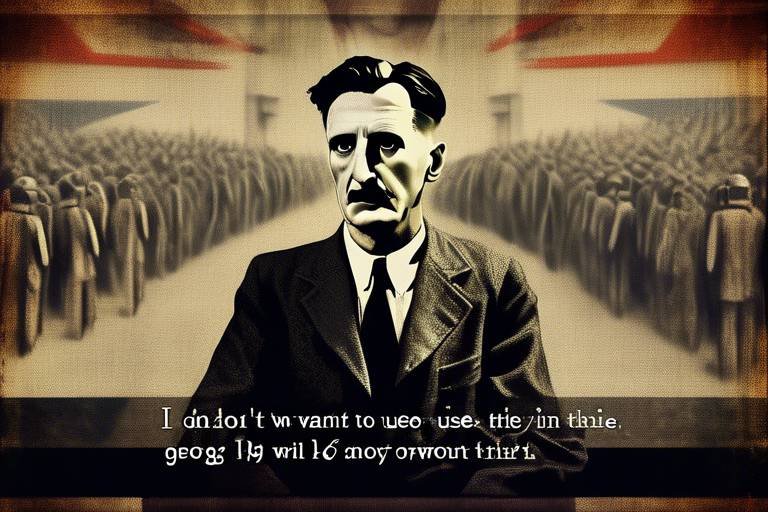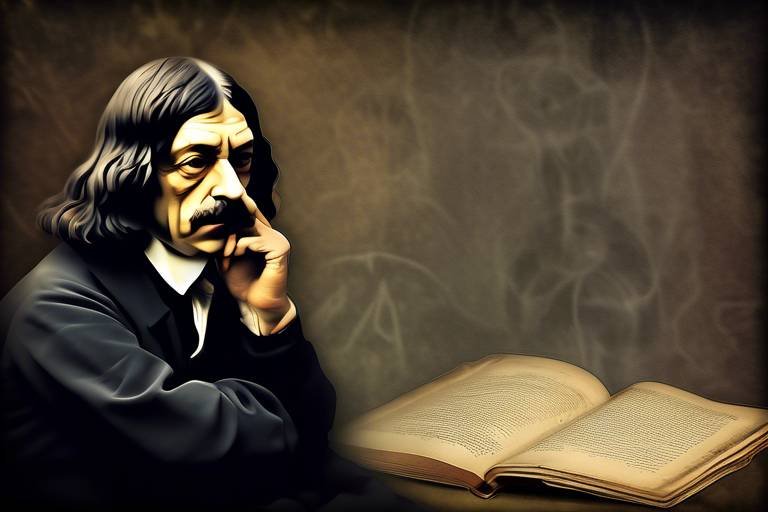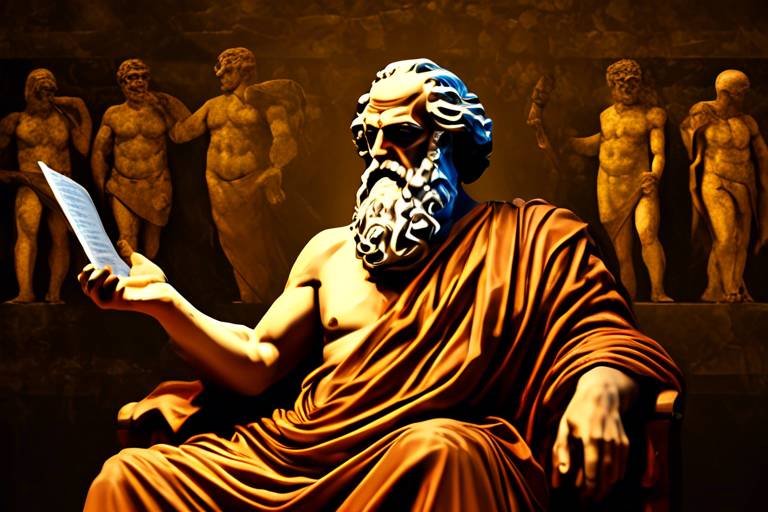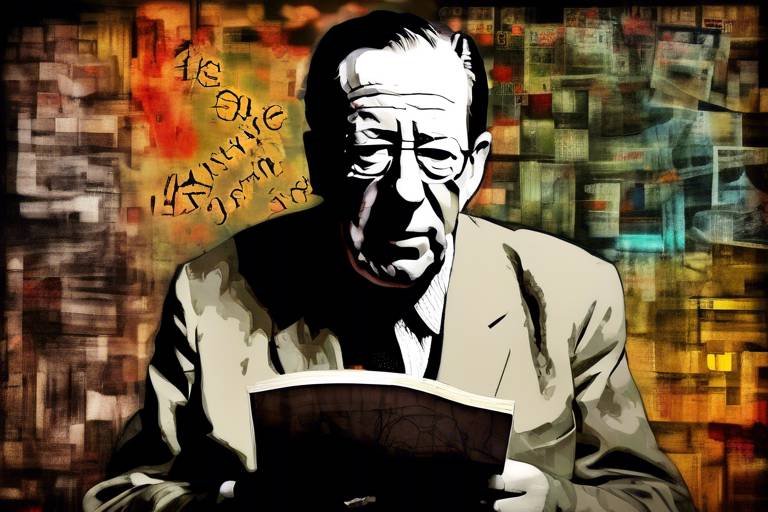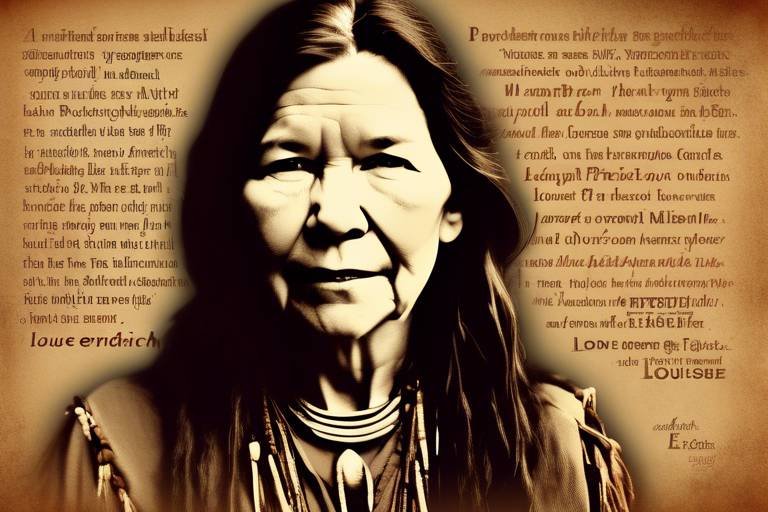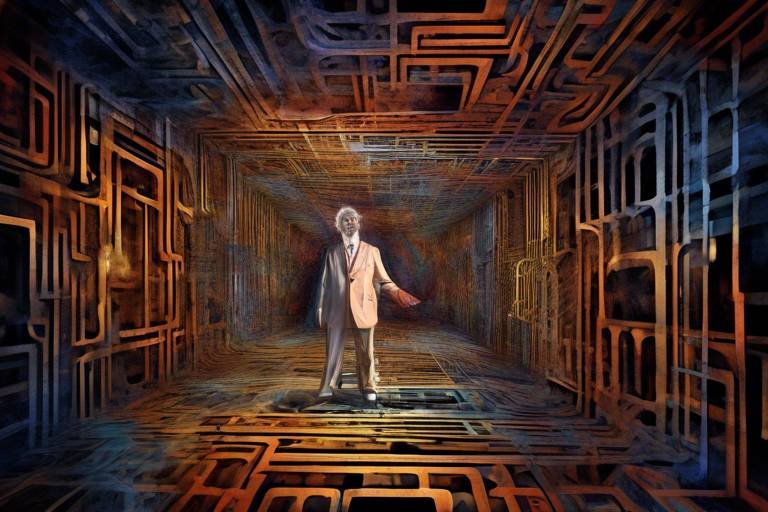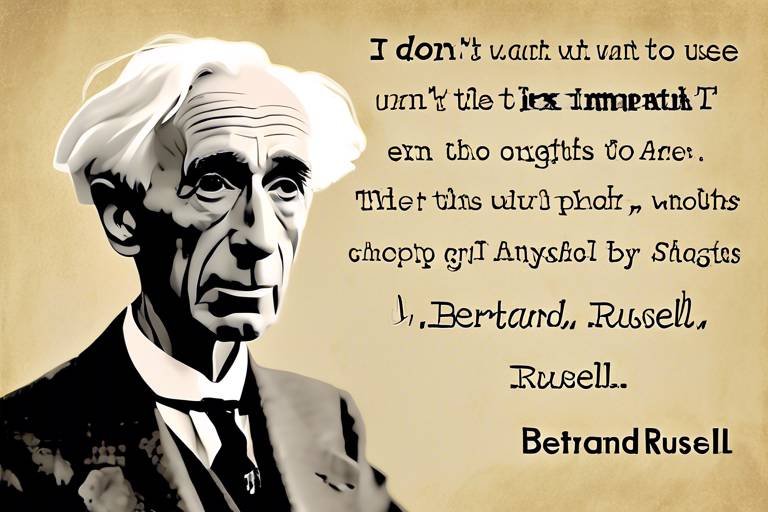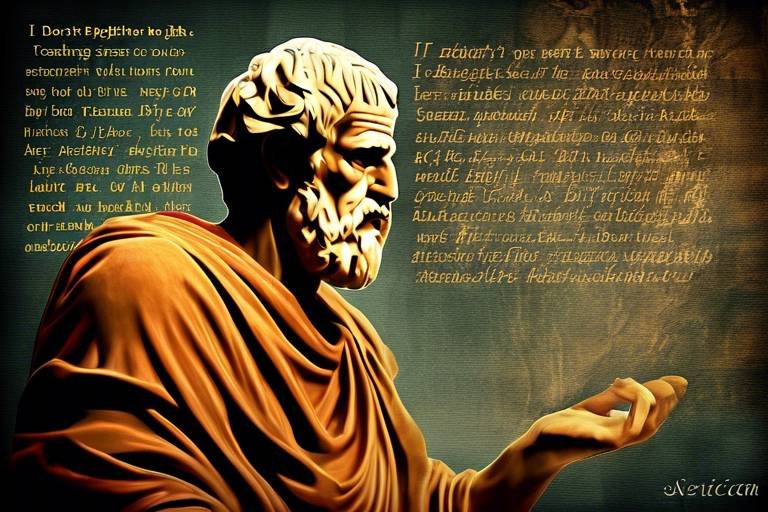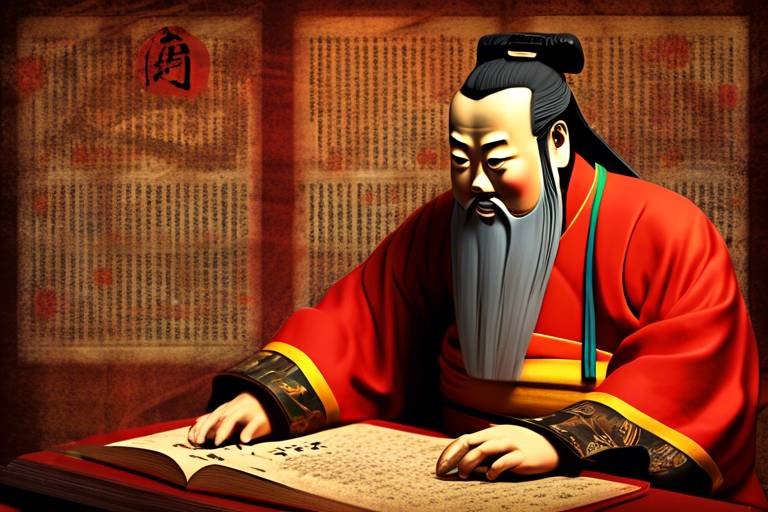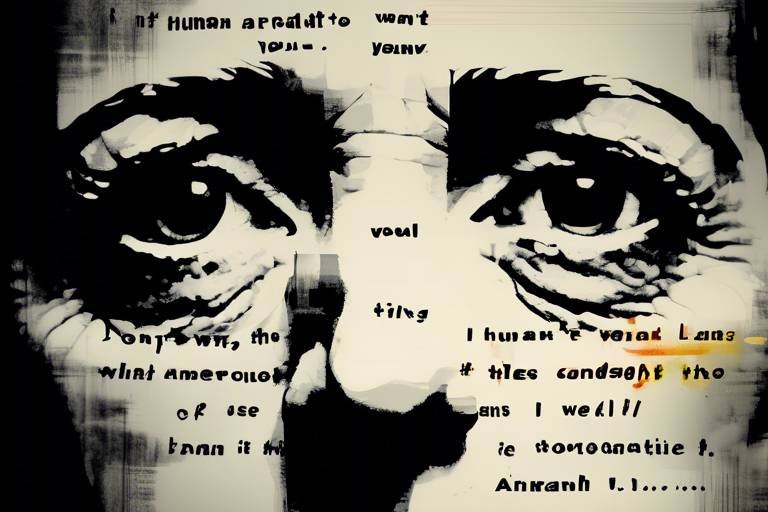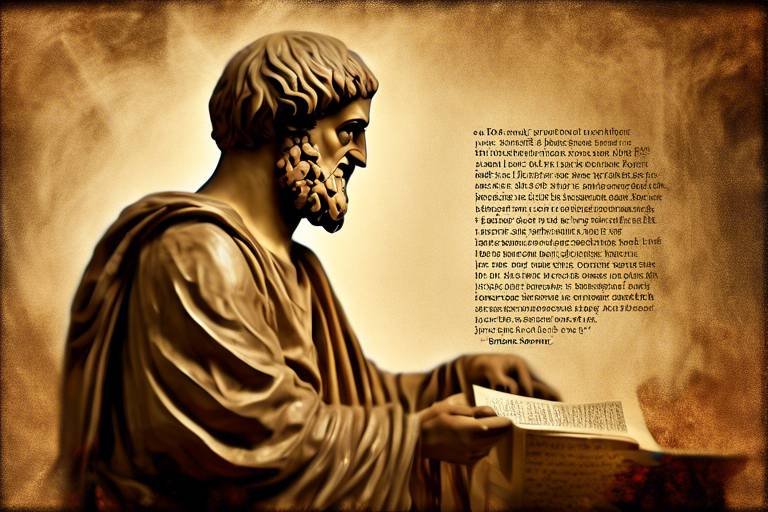The Dystopian Philosophy in George Orwell's 1984
George Orwell's 1984 is not just a novel; it's a chilling glimpse into a world where freedom is a mere illusion and the concept of truth is twisted beyond recognition. This article explores the intricate themes of dystopia in Orwell's seminal work, examining its philosophical implications on society, freedom, and the nature of truth. The narrative serves as a warning, urging us to reflect on the fragility of our own liberties and the importance of questioning authority. As we dive into this dystopian landscape, we will uncover how Orwell's insights remain profoundly relevant in today's world.
Dystopia, a term frequently associated with Orwell's 1984, describes a society characterized by oppressive control and a loss of individuality. In essence, a dystopian society is the antithesis of a utopia. It is marked by a pervasive sense of fear, where the government exerts total control over every aspect of life. The citizens are stripped of their rights, and their identities are reduced to mere numbers. In 1984, we see a world where the government, referred to as "The Party," manipulates reality to maintain its grip on power. The defining features of dystopian literature can be summarized as follows:
- Oppressive Government: A regime that exercises extreme control over its citizens.
- Loss of Individuality: The suppression of personal freedoms and unique identities.
- Surveillance: Constant monitoring of citizens to enforce compliance.
- Manipulation of Truth: Alteration of facts and history to serve the regime's narrative.
Surveillance is a cornerstone of the oppressive regime in 1984. The Party employs advanced technology and psychological tactics to monitor citizens continuously. This constant watching creates an atmosphere of fear, stifling any dissenting thoughts. Imagine living in a world where your every move is scrutinized, where even your thoughts are not safe from the prying eyes of the government. This relentless surveillance affects personal freedom and the psychology of citizens under totalitarian rule. It breeds paranoia and conformity, as individuals become acutely aware that any deviation from the norm could result in dire consequences.
Big Brother symbolizes the omnipresent government in 1984. His image is everywhere, watching, judging, and controlling. The phrase "Big Brother is watching you" serves as a constant reminder of the Party's power. This figure embodies the loss of privacy and individual autonomy, instilling a sense of helplessness among the populace. The citizens are conditioned to believe that their thoughts and actions are always under scrutiny, leading to a society where self-censorship becomes a survival mechanism. In such a world, how can one truly be free?
The Party employs psychological tactics to maintain control over its citizens. Methods like fear, propaganda, and indoctrination are used to manipulate the populace's thoughts and beliefs. The constant bombardment of state-sponsored propaganda creates a reality where the Party's version of truth is accepted without question. The use of slogans such as "War is Peace" and "Freedom is Slavery" exemplifies the absurdity of the Party's manipulation. These phrases are not just catchy; they are tools of control, designed to confuse and disorient the citizens, making them more susceptible to the Party's influence.
Surveillance and control disrupt personal relationships in 1984. The Party's influence erodes trust and intimacy among individuals. In a society where everyone is a potential informant, genuine connections become rare. The protagonist, Winston Smith, struggles to form meaningful relationships in a world where love is seen as a threat to the state. The Party's intrusion into personal lives creates a cold, isolating environment, where even the most basic human emotions are suppressed. This leads to a profound sense of loneliness and despair, as individuals grapple with their inability to connect with one another.
In 1984, language is manipulated to limit thought. The concept of Newspeak is central to this idea, as it is designed to reduce the range of thoughts that individuals can express. By systematically eliminating words associated with rebellion or dissent, the Party seeks to control the very thoughts of its citizens. This linguistic manipulation raises profound questions about freedom of expression and critical thinking. If language shapes our thoughts, what happens when our language is stripped down to a mere tool of the state?
Truth is a central theme in 1984, where the Party controls reality. The malleability of truth under totalitarian regimes poses significant philosophical implications. In this world, facts are not fixed; they can be altered at will to serve the Party's narrative. The idea that "who controls the past controls the future" encapsulates the Party's strategy of historical revisionism, creating a populace that is unable to trust its memories or beliefs.
The Party's alteration of history serves to control the narrative. By continuously rewriting the past, the Party ensures that its version of reality remains unchallenged. This manipulation has profound effects on collective memory and identity, as citizens lose the ability to discern fact from fiction. The past becomes a fluid concept, leaving individuals disoriented and dependent on the Party for their understanding of reality.
Doublethink is a crucial concept in 1984, allowing individuals to accept contradictory beliefs simultaneously. This cognitive dissonance is a powerful tool for the Party, facilitating compliance and acceptance of its doctrines. The ability to hold two opposing thoughts without conflict is a hallmark of totalitarian control, illustrating how deeply the Party has infiltrated the minds of its citizens. In a world where truth is subjective, how can one maintain any sense of reality?
- What is the main theme of 1984? The main theme of 1984 revolves around the dangers of totalitarianism and the loss of individuality and freedom.
- How does surveillance play a role in the novel? Surveillance is a key element in 1984, as it creates a climate of fear and conformity among citizens.
- What is Newspeak? Newspeak is a language created by the Party in 1984 to limit freedom of thought and expression.
- What does Big Brother represent? Big Brother represents the omnipresent government and the loss of privacy in 1984.

1984,
This article explores the intricate themes of dystopia in George Orwell's seminal work, 1984, examining its philosophical implications on society, freedom, and the nature of truth.
Dystopia, a term frequently associated with Orwell's 1984, describes a society characterized by oppressive control and a loss of individuality. Imagine a world where every thought, every action, and every word is monitored—a world where freedom is but a distant memory. This section delves into the defining features of dystopian literature, highlighting how such narratives serve as cautionary tales about the potential pitfalls of unchecked authority. Key elements often include:
- Authoritarian Governance: A central authority that exerts total control over citizens.
- Surveillance: Constant monitoring that stifles personal freedom.
- Loss of Individuality: The suppression of personal identity in favor of conformity.
Surveillance is a cornerstone of the oppressive regime in 1984. Picture a world where your every move is watched, where privacy is an illusion, and where fear is the currency of control. This subheading analyzes how constant monitoring affects personal freedom and the psychology of citizens under totalitarian rule. The omnipresent eyes of the Party create a culture of fear, compelling individuals to self-censor and conform. This psychological pressure not only stifles creativity but also fosters a sense of hopelessness among the populace.
Big Brother symbolizes the omnipresent government in 1984. With his watchful gaze, he represents the ultimate loss of privacy and individual autonomy. The mere mention of his name instills fear, reminding citizens that they are never truly alone. This section discusses how the figure of Big Brother embodies the oppressive nature of the regime, serving as a constant reminder that rebellion is futile. The slogan "Big Brother is watching you" encapsulates this sentiment, creating a chilling atmosphere where trust is shattered, and loyalty to the Party is paramount.
The Party employs psychological tactics to maintain control. This subheading explores methods like fear, propaganda, and indoctrination used to manipulate the populace's thoughts and beliefs. Through relentless propaganda, the Party distorts reality, making citizens believe in the infallibility of the regime. Fear is wielded like a weapon, with the Thought Police lurking in the shadows, ready to punish dissent. The result? A society where individuals are conditioned to accept lies as truth and silence their own thoughts to survive.
Surveillance and control disrupt personal relationships in 1984. The Party's influence erodes trust and intimacy among individuals, turning friends into spies and lovers into strangers. When every conversation is a potential trap, how can genuine connections flourish? This section examines how the Party's oppressive tactics create an environment where relationships are superficial at best. The fear of betrayal looms large, leading individuals to prioritize loyalty to the Party over personal bonds.
In 1984, language is manipulated to limit thought. This subheading discusses the concept of Newspeak and its implications for freedom of expression and critical thinking. Newspeak is not just a language; it's a tool designed to eliminate dissent by restricting the range of thoughts that can be expressed. If you can’t articulate a thought, can you even think it? This chilling reality illustrates how the Party seeks to control the very essence of human expression, making rebellion not only difficult but virtually impossible.
Truth is a central theme in 1984, where the Party controls reality. This section investigates the philosophical implications of truth and its malleability under totalitarian regimes. In a world where truth is dictated by those in power, the concept of objective reality becomes a relic of the past. The Party's manipulation of truth raises profound questions about the nature of reality itself and the consequences of living in a world where facts are fluid.
The Party's alteration of history serves to control the narrative. This subheading analyzes the effects of historical revisionism on collective memory and identity. By constantly rewriting the past, the Party ensures that its version of events is the only one that exists. This manipulation not only shapes public perception but also erases personal and collective identities, leaving citizens adrift in a sea of uncertainty.
Doublethink is a crucial concept in 1984, allowing individuals to accept contradictory beliefs. This section explores how doublethink facilitates compliance and acceptance of the Party's doctrines. The ability to hold two conflicting ideas simultaneously is not just a mental exercise; it's a survival mechanism in a world where questioning the Party is tantamount to treason. This cognitive dissonance becomes a way of life, enabling citizens to navigate the complexities of their oppressive reality.
- What is the main theme of 1984? The main theme revolves around the dangers of totalitarianism and the oppressive nature of surveillance and control over individual freedoms.
- How does language play a role in 1984? Language is manipulated through Newspeak to limit thought and expression, ensuring that dissent is virtually impossible.
- What is doublethink? Doublethink is the ability to accept two contradictory beliefs simultaneously, a crucial concept for survival in the world of 1984.
- How does Big Brother influence society? Big Brother serves as a symbol of the Party's omnipresence, instilling fear and ensuring loyalty through constant surveillance.

examining its philosophical implications on society, freedom, and the nature of truth.
This article explores the intricate themes of dystopia in George Orwell's seminal work, 1984, examining its philosophical implications on society, freedom, and the nature of truth.
Dystopia, a term frequently associated with Orwell's 1984, describes a society characterized by oppressive control and a loss of individuality. This section delves into the defining features of dystopian literature.
Surveillance is a cornerstone of the oppressive regime in 1984. This subheading analyzes how constant monitoring affects personal freedom and the psychology of citizens under totalitarian rule.
Big Brother symbolizes the omnipresent government in 1984. This section discusses how the figure of Big Brother embodies the loss of privacy and individual autonomy.
The Party employs psychological tactics to maintain control. This subheading explores methods like fear, propaganda, and indoctrination used to manipulate the populace's thoughts and beliefs.
Surveillance and control disrupt personal relationships in 1984. This section examines how the Party's influence erodes trust and intimacy among individuals.
In 1984, language is manipulated to limit thought. This subheading discusses the concept of Newspeak and its implications for freedom of expression and critical thinking.
Truth is a central theme in 1984, where the Party controls reality. This section investigates the philosophical implications of truth and its malleability under totalitarian regimes.
The Party's alteration of history serves to control the narrative. This subheading analyzes the effects of historical revisionism on collective memory and identity.
Doublethink is a crucial concept in 1984, allowing individuals to accept contradictory beliefs. This section explores how doublethink facilitates compliance and acceptance of the Party's doctrines.
When we delve into the philosophical implications of Orwell's 1984, we uncover a complex tapestry woven with threads of society, freedom, and the nature of truth. The novel presents a grim warning about the fragility of these concepts in the face of authoritarianism. In a world where the government dictates reality, the very notion of truth becomes a malleable construct, shaped by those in power. This raises a critical question: if truth can be manipulated, what does that mean for our understanding of freedom?
Orwell's depiction of a society stripped of its freedoms serves as a chilling reminder of what can happen when individuals relinquish their rights to an all-powerful state. The citizens of Oceania live under a regime that not only surveils their actions but also seeks to control their thoughts. This brings us to the idea of autonomy. In a society where the government can dictate what is true, can individuals ever truly be free? The answer, as Orwell suggests, is a resounding no. The loss of freedom is not merely physical; it is deeply psychological, as the Party instills a sense of fear and uncertainty in its citizens.
Moreover, the nature of truth in 1984 is intricately linked to the concept of doublethink. This cognitive dissonance allows individuals to hold two contradictory beliefs simultaneously, effectively blurring the lines between reality and fiction. In this way, Orwell illustrates a society where the truth is not an absolute but rather a tool wielded by the powerful. The implications of this are staggering: if truth is subjective, how can society function? How can we trust our perceptions and beliefs?
The philosophical implications extend beyond the pages of the novel, challenging readers to reflect on their own society. Are we, too, at risk of losing our grip on truth? As we navigate an era of information overload, the lessons from 1984 resonate more than ever. The battle for truth is not just a literary theme; it is a pressing issue in our contemporary world, where misinformation can spread like wildfire, and the line between fact and fiction is increasingly blurred.
In conclusion, Orwell's 1984 serves as a profound exploration of the delicate balance between society, freedom, and truth. It compels us to question the structures of power that govern our lives and to remain vigilant in the pursuit of genuine understanding and autonomy. The philosophical implications of this dystopian narrative remind us that freedom is not merely the absence of oppression, but the presence of truth, integrity, and the ability to think independently.
- What is the main theme of 1984? The main theme of 1984 revolves around the dangers of totalitarianism and the manipulation of truth and reality.
- How does Orwell portray surveillance in 1984? Orwell portrays surveillance as an omnipresent force that controls and oppresses individuals, stripping them of their freedom and privacy.
- What is doublethink? Doublethink is the ability to accept two contradictory beliefs at the same time, a concept used by the Party to maintain control over the populace.
- How does 1984 relate to modern society? 1984 relates to modern society through its exploration of truth, freedom, and the consequences of unchecked power, prompting readers to reflect on their own realities.

Understanding Dystopia
Dystopia is a term that evokes images of bleak futures and oppressive societies, often characterized by a total loss of individuality and freedom. In George Orwell's 1984, this concept is brought to life in a way that forces readers to confront the chilling implications of a world where the state exerts total control over its citizens. But what exactly defines a dystopian society? At its core, dystopia is about the inversion of utopia—a place that is supposed to be perfect but instead reveals itself as a nightmare.
In 1984, we see the defining features of dystopian literature manifest in various ways. The society depicted is marked by extreme government surveillance, oppressive laws, and the erasure of personal freedoms. Citizens live in a constant state of fear, where even their thoughts are monitored by the omnipresent figure of Big Brother. This creates an atmosphere where individuality is stifled, and conformity is enforced. Imagine living in a world where your every move is watched, and your thoughts could lead to your demise. It's a terrifying prospect, and Orwell masterfully illustrates this through the experiences of his protagonist, Winston Smith.
Furthermore, dystopian societies often employ a range of tactics to maintain control over the populace. These can include:
- Surveillance: Constant monitoring by the state to ensure compliance.
- Propaganda: Manipulation of information to shape public perception.
- Fear Tactics: Use of intimidation to suppress dissent and opposition.
Each of these elements contributes to a pervasive atmosphere of oppression, where the line between reality and fiction is blurred. The loss of personal identity is another hallmark of dystopia; in 1984, individuals are reduced to mere numbers, stripped of their names and histories, making it easier for the Party to control them.
Orwell's exploration of dystopia also raises philosophical questions about the nature of freedom and truth. When a society is governed by fear and manipulation, can true freedom ever exist? Is it possible for individuals to think critically and form their own opinions when they are bombarded with propaganda? These questions linger long after the final page is turned, prompting readers to reflect on their own realities.
In summary, understanding dystopia requires a deep dive into the mechanisms of control and the psychological effects of living under an oppressive regime. Orwell's 1984 serves as a cautionary tale, reminding us of the fragility of freedom and the importance of questioning the narratives presented to us. As we grapple with our own societal challenges, the lessons of dystopian literature remain as relevant as ever.

1984,
This article explores the intricate themes of dystopia in George Orwell's seminal work, 1984, examining its philosophical implications on society, freedom, and the nature of truth.
Dystopia, a term frequently associated with Orwell's 1984, describes a society characterized by oppressive control and a loss of individuality. Imagine a world where every action is monitored, every thought is scrutinized, and the very essence of what it means to be human is stripped away. This section delves into the defining features of dystopian literature, highlighting how these elements serve as a warning against totalitarianism. Key characteristics often include:
- Government Control: A ruling body that exerts extreme influence over every aspect of life.
- Surveillance: Constant monitoring that invades personal privacy and freedom.
- Loss of Individuality: A culture that promotes conformity and discourages personal expression.
- Propaganda: The use of biased information to manipulate public perception.
Surveillance is a cornerstone of the oppressive regime in 1984. The omnipresent gaze of the Party instills a sense of fear and paranoia among citizens, making them question their every move. The very act of being watched alters behavior, as individuals begin to self-censor, leading to a society where true freedom is an illusion. In this environment, personal freedom is sacrificed at the altar of security, creating a psychological landscape where trust is eroded and loyalty is to the Party alone.
Big Brother symbolizes the omnipresent government in 1984. His face, plastered on posters with the chilling slogan "Big Brother is watching you," serves as a constant reminder of the Party's control. This figure embodies the loss of privacy and individual autonomy, creating an atmosphere where dissent is not just dangerous but unthinkable. The threat of surveillance looms large, ensuring that citizens remain compliant, as the fear of punishment outweighs the desire for personal freedom.
The Party employs psychological tactics to maintain control over the populace. Fear, propaganda, and indoctrination are not mere tools; they are the lifeblood of the regime. By instilling a sense of dread and uncertainty, the Party keeps citizens in line. The use of propaganda, such as the constant repetition of slogans and the glorification of Party leaders, shapes perceptions and beliefs. This manipulation of thought is so pervasive that it becomes nearly impossible for individuals to distinguish between reality and the Party's version of it.
Surveillance and control disrupt personal relationships in 1984. The Party's influence erodes trust and intimacy among individuals, turning friends into informants and family members into potential enemies. The fear of betrayal looms over every interaction, making genuine connections nearly impossible. Love and loyalty are replaced by suspicion and self-preservation, as the Party's ideology infiltrates the most private aspects of life. In this world, relationships are transactional, driven by fear rather than affection.
In 1984, language is manipulated to limit thought. The concept of Newspeak—a language designed to diminish the range of thought—illustrates how the Party seeks to control not just actions, but the very thoughts of its citizens. By simplifying language and eliminating words associated with rebellion or freedom, the Party aims to make dissent literally unthinkable. This linguistic control is a powerful tool that reinforces the Party's dominance, as it shapes reality itself, making it increasingly difficult for individuals to articulate their grievances or desires.
Truth is a central theme in 1984, where the Party controls reality itself. The idea that "truth is subjective" becomes a weapon in the hands of the regime, allowing them to manipulate facts and rewrite history. This section investigates the philosophical implications of truth and its malleability under totalitarian regimes, challenging the very foundation of what it means to know something. In a world where the Party dictates reality, the concept of objective truth becomes a relic of the past, leading to a society where lies are accepted as truth.
The Party's alteration of history serves to control the narrative. By constantly rewriting the past, the regime shapes collective memory and identity, ensuring that citizens remain unaware of their own history. This manipulation creates a populace that is easily controlled, as they lack the context to question the Party's authority. The effects of historical revisionism are profound, leading to a society that is disconnected from its roots and vulnerable to the Party's influence.
Doublethink is a crucial concept in 1984, allowing individuals to accept contradictory beliefs simultaneously. This cognitive dissonance is not just a byproduct of living under a totalitarian regime; it is a necessity for survival. By embracing doublethink, citizens can navigate the complexities of Party doctrine without questioning its validity. This section explores how doublethink facilitates compliance and acceptance of the Party's doctrines, ultimately leading to a society where critical thinking is not only discouraged but deemed impossible.
- What is the main theme of 1984? The main theme of 1984 is the dangers of totalitarianism and the ways in which power can corrupt truth and individual freedom.
- How does surveillance affect the characters in 1984? Surveillance creates an atmosphere of fear and paranoia, leading characters to self-censor and distrust one another.
- What is Newspeak and why is it important? Newspeak is a language designed to limit the range of thought; it is crucial because it illustrates how language can be used as a tool of oppression.
- What role does Big Brother play in the story? Big Brother represents the Party's control and serves as a constant reminder of the regime's surveillance and authority.

describes a society characterized by oppressive control and a loss of individuality. This section delves into the defining features of dystopian literature.
This article explores the intricate themes of dystopia in George Orwell's seminal work, 1984, examining its philosophical implications on society, freedom, and the nature of truth.
Dystopia, a term frequently associated with Orwell's 1984, describes a society characterized by oppressive control and a loss of individuality. At its core, dystopian literature serves as a mirror reflecting the darkest aspects of human nature and societal structures. It often presents a future where the government wields unchecked power, leading to a world where personal freedoms are sacrificed on the altar of security and conformity. In such societies, the line between right and wrong blurs, and the individual becomes a mere cog in the machine of the state.
One defining feature of dystopian literature is the presence of a totalitarian regime. In 1984, the Party, led by the enigmatic Big Brother, exerts absolute control over the citizens of Oceania. This regime employs various tactics to enforce compliance and suppress dissent, including surveillance, propaganda, and brutal punishment for those who dare to challenge the status quo. The concept of Big Brother serves as a chilling reminder of the ever-watchful eye of authority, instilling a pervasive sense of fear among the populace.
Furthermore, dystopian societies often strip away the individuality of their citizens. In 1984, the Party systematically erases personal identities, reducing people to mere numbers and roles within the societal framework. The idea of self-expression is not just discouraged; it is actively punished. This loss of individuality is poignantly illustrated through the character of Winston Smith, whose struggle against the Party's oppressive ideology highlights the human desire for autonomy and the inherent conflict between the individual and the state.
Another critical aspect of dystopian literature is the manipulation of truth and reality. In Orwell's world, the Party controls not only the actions of its citizens but also their thoughts. The concept of Newspeak—a language designed to limit the range of thought—serves as a tool for the Party to maintain power. By restricting language, the Party aims to eliminate any possibility of rebellion or dissent. This manipulation of truth creates a society where reality is subjective, and the populace is left questioning what is real and what is fabricated.
Ultimately, the essence of dystopian literature lies in its ability to provoke thought and inspire caution. It serves as a warning about the dangers of unchecked power and the fragility of freedom. The themes explored in 1984 resonate deeply in contemporary society, reminding us of the importance of vigilance in safeguarding our rights and individuality against the encroaching forces of oppression.
Surveillance is a cornerstone of the oppressive regime in 1984. This subheading analyzes how constant monitoring affects personal freedom and the psychology of citizens under totalitarian rule.
Big Brother symbolizes the omnipresent government in 1984. This section discusses how the figure of Big Brother embodies the loss of privacy and individual autonomy.
The Party employs psychological tactics to maintain control. This subheading explores methods like fear, propaganda, and indoctrination used to manipulate the populace's thoughts and beliefs.
Surveillance and control disrupt personal relationships in 1984. This section examines how the Party's influence erodes trust and intimacy among individuals.
In 1984, language is manipulated to limit thought. This subheading discusses the concept of Newspeak and its implications for freedom of expression and critical thinking.
Truth is a central theme in 1984, where the Party controls reality. This section investigates the philosophical implications of truth and its malleability under totalitarian regimes.
The Party's alteration of history serves to control the narrative. This subheading analyzes the effects of historical revisionism on collective memory and identity.
Doublethink is a crucial concept in 1984, allowing individuals to accept contradictory beliefs. This section explores how doublethink facilitates compliance and acceptance of the Party's doctrines.
- What is the main theme of 1984? The main theme of 1984 is the struggle against totalitarianism and the loss of individuality.
- How does Orwell portray surveillance in 1984? Orwell portrays surveillance as a means of oppression, where citizens are constantly monitored to maintain control.
- What is Newspeak and why is it important? Newspeak is a language designed to restrict thought and limit the ability to express dissent, playing a crucial role in the Party's control.
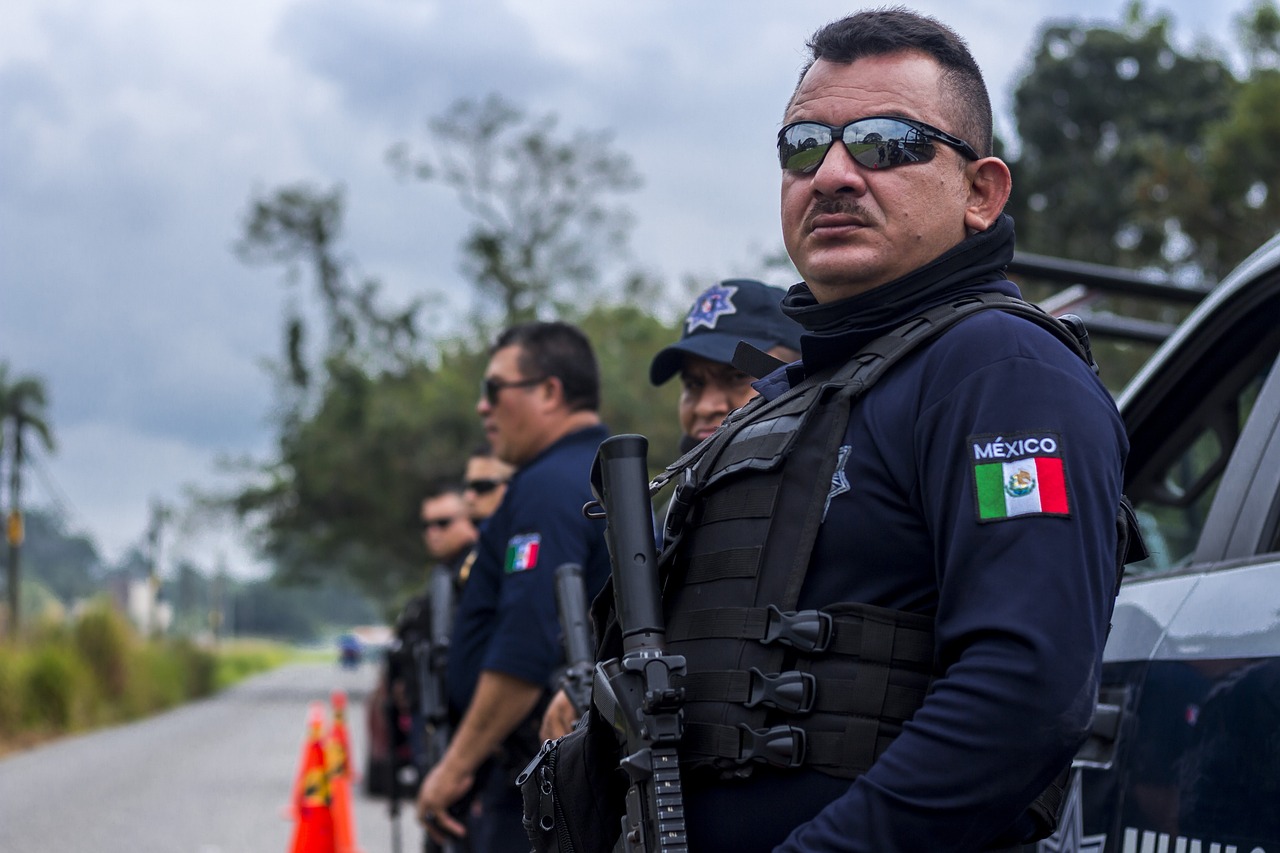
The Role of Surveillance
In George Orwell's 1984, surveillance isn't just a tool; it's a way of life. The omnipresent eyes of the Party serve to create a climate of fear and compliance among the citizens of Oceania. Imagine living in a world where every move you make is watched, where even your thoughts can be scrutinized. This is the reality for Winston Smith and his fellow citizens, who are constantly aware that they might be under the watchful gaze of Big Brother. The concept of surveillance in 1984 goes beyond mere observation; it infiltrates the very fabric of society, dictating how individuals behave, think, and interact with one another.
The Party employs a variety of methods to ensure that its citizens are always under surveillance. This includes:
- Telescreens: These devices are installed in every home and public space, broadcasting propaganda while simultaneously monitoring individuals' activities.
- Thought Police: A secret police force that enforces loyalty to the Party, punishing any form of dissent or rebellious thought.
- Public Informants: Citizens are encouraged to report on each other, creating an atmosphere of distrust and paranoia.
The psychological impact of such relentless surveillance is profound. It not only stifles individual freedom but also alters the way people relate to one another. Trust becomes a rare commodity, and genuine relationships are replaced by a facade of compliance. In this environment, even the most intimate expressions of love and friendship are tainted by the fear of betrayal. The Party's control extends into the private lives of individuals, making it nearly impossible to form authentic connections.
Moreover, the constant threat of being watched leads to a phenomenon known as self-censorship. People begin to modify their behaviors and thoughts to align with the Party's expectations, often without even realizing it. This is a chilling reminder of how powerful surveillance can be in shaping not just actions, but also beliefs and identities. The line between personal freedom and state control becomes increasingly blurred, leaving individuals trapped in a cycle of compliance.
Ultimately, the role of surveillance in 1984 is not merely about keeping an eye on citizens; it is about creating a society where individuality is crushed under the weight of totalitarian oversight. Orwell's depiction serves as a stark warning about the dangers of unchecked governmental power and the lengths to which a regime will go to maintain control over its populace.
Q: How does surveillance affect personal freedom in 1984?
A: Surveillance in 1984 severely limits personal freedom by instilling fear and encouraging self-censorship, leading individuals to conform to the Party's expectations.
Q: What role do telescreens play in the society of 1984?
A: Telescreens serve dual purposes: they broadcast propaganda while simultaneously monitoring citizens' behavior, making it impossible to escape the Party's watchful eye.
Q: How does the concept of self-censorship manifest in 1984?
A: Individuals begin to alter their thoughts and behaviors to align with Party ideology, often subconsciously, due to the pervasive surveillance and fear of punishment.

1984.
This article explores the intricate themes of dystopia in George Orwell's seminal work, 1984, examining its philosophical implications on society, freedom, and the nature of truth.
Dystopia, a term frequently associated with Orwell's 1984, describes a society characterized by oppressive control and a loss of individuality. This section delves into the defining features of dystopian literature. Dystopian worlds often present a bleak vision of the future, where the government's iron grip stifles personal freedom and creativity. In these narratives, the **individual** often finds themselves at odds with a **monolithic authority**, creating a tension that drives the plot and highlights the consequences of unchecked power.
Surveillance is a cornerstone of the oppressive regime in 1984. This subheading analyzes how constant monitoring affects personal freedom and the psychology of citizens under totalitarian rule. In Orwell's world, the notion of privacy is an illusion; citizens are perpetually watched by telescreens and the ever-present gaze of Big Brother. This omnipresent surveillance creates a state of anxiety and paranoia, compelling individuals to conform to societal norms, lest they be punished for their thoughts or actions.
Big Brother symbolizes the omnipresent government in 1984. This section discusses how the figure of Big Brother embodies the loss of privacy and individual autonomy. The phrase "Big Brother is watching you" serves as a chilling reminder that no thought is safe from scrutiny. The Party uses this figure to instill fear and loyalty, creating a society where rebellion is not just dangerous, but unthinkable. The very idea of Big Brother transforms from a mere character into an oppressive force that looms over every aspect of life, making citizens feel powerless and isolated.
The Party employs psychological tactics to maintain control. This subheading explores methods like fear, propaganda, and indoctrination used to manipulate the populace's thoughts and beliefs. Through the use of slogans such as "War is Peace" and "Freedom is Slavery," the Party distorts reality, making it difficult for individuals to discern truth from falsehood. This manipulation extends to the education system, where children are taught to spy on their parents, further eroding familial bonds and trust. The result is a society where loyalty to the Party outweighs personal relationships, creating a chilling atmosphere of betrayal.
Surveillance and control disrupt personal relationships in 1984. This section examines how the Party's influence erodes trust and intimacy among individuals. In a world where every interaction is monitored, genuine connections become fraught with suspicion. Love and friendship are twisted into tools of the Party, as citizens are encouraged to report any signs of dissent. The emotional landscape of the characters in 1984 is barren, as the fear of betrayal looms large, driving wedges between even the closest of companions. The Party's manipulation of relationships underscores the profound impact of totalitarianism on human connection.
In 1984, language is manipulated to limit thought. This subheading discusses the concept of Newspeak and its implications for freedom of expression and critical thinking. Newspeak is designed to eliminate the possibility of rebellious thoughts by reducing the complexity of language. By stripping away nuanced vocabulary, the Party seeks to control not just what people say, but how they think. The idea is that if a person cannot articulate dissent, they cannot conceive of it. This linguistic control is a powerful tool in the Party's arsenal, illustrating how language shapes reality and influences perception.
Truth is a central theme in 1984, where the Party controls reality. This section investigates the philosophical implications of truth and its malleability under totalitarian regimes. In Orwell's dystopia, truth is not an absolute; it is a construct that the Party manipulates to maintain power. The Party's slogan, "Who controls the past controls the future; who controls the present controls the past," encapsulates this idea. By rewriting history, the Party crafts a narrative that serves its interests, leaving citizens disoriented and dependent on the Party for their understanding of reality.
The Party's alteration of history serves to control the narrative. This subheading analyzes the effects of historical revisionism on collective memory and identity. By constantly rewriting historical events, the Party ensures that its version of reality remains unchallenged. This creates a populace that is confused about its own identity, as the past becomes a fluid concept. The manipulation of history not only serves to legitimize the Party's rule but also erodes any sense of individual or collective agency.
Doublethink is a crucial concept in 1984, allowing individuals to accept contradictory beliefs. This section explores how doublethink facilitates compliance and acceptance of the Party's doctrines. It is a form of cognitive dissonance that enables citizens to hold two opposing ideas simultaneously, making them malleable to the Party's will. This manipulation of thought is not just a tool of oppression; it is a survival mechanism in a world where questioning the Party is tantamount to treason. Doublethink exemplifies the terrifying power of totalitarianism to reshape not just society, but the very fabric of human thought.
- What is the significance of Big Brother in 1984?
Big Brother represents the oppressive government and the loss of privacy in society, symbolizing the constant surveillance that controls citizens' lives. - How does Orwell portray the concept of truth?
In 1984, truth is malleable and controlled by the Party, illustrating how power can manipulate reality and historical narratives. - What is Newspeak and why is it important?
Newspeak is a language designed to limit thought and expression, highlighting the connection between language and freedom in a totalitarian regime. - How does surveillance affect personal relationships in 1984?
Surveillance creates an atmosphere of distrust, eroding intimacy and encouraging betrayal among individuals, as they fear being reported to the Party.

This subheading analyzes how constant monitoring affects personal freedom and the psychology of citizens under totalitarian rule.
This article explores the intricate themes of dystopia in George Orwell's seminal work, 1984, examining its philosophical implications on society, freedom, and the nature of truth.
Dystopia, a term frequently associated with Orwell's 1984, describes a society characterized by oppressive control and a loss of individuality. This section delves into the defining features of dystopian literature.
Surveillance is a cornerstone of the oppressive regime in 1984. This subheading analyzes how constant monitoring affects personal freedom and the psychology of citizens under totalitarian rule.
Big Brother symbolizes the omnipresent government in 1984. This section discusses how the figure of Big Brother embodies the loss of privacy and individual autonomy.
The Party employs psychological tactics to maintain control. This subheading explores methods like fear, propaganda, and indoctrination used to manipulate the populace's thoughts and beliefs.
Surveillance and control disrupt personal relationships in 1984. This section examines how the Party's influence erodes trust and intimacy among individuals.
In 1984, language is manipulated to limit thought. This subheading discusses the concept of Newspeak and its implications for freedom of expression and critical thinking.
Truth is a central theme in 1984, where the Party controls reality. This section investigates the philosophical implications of truth and its malleability under totalitarian regimes.
The Party's alteration of history serves to control the narrative. This subheading analyzes the effects of historical revisionism on collective memory and identity.
Doublethink is a crucial concept in 1984, allowing individuals to accept contradictory beliefs. This section explores how doublethink facilitates compliance and acceptance of the Party's doctrines.
Surveillance in George Orwell's 1984 is not just about watching; it's a pervasive force that seeps into the very fabric of personal freedom. Imagine living in a world where every action, every word, and even your thoughts are monitored by an all-seeing authority. This constant scrutiny transforms the psyche of citizens, creating an atmosphere of fear and compliance. People begin to self-censor their thoughts and behaviors, knowing that they are always being watched. The psychological impact is profound; individuals feel as if they are living under a microscope, leading to a state of perpetual anxiety.
In such an environment, the notion of personal freedom becomes an illusion. The Party's surveillance tactics ensure that citizens are not only aware of their physical surroundings but also of the invisible chains binding their minds. This leads to a culture where conformity is not just encouraged, but is the only means of survival. The fear of being reported or punished for even the slightest deviation from Party norms stifles creativity, dissent, and individuality.
Moreover, the psychological toll of this constant monitoring can be likened to a form of social conditioning. People begin to internalize the Party's expectations, leading to a loss of critical thinking and personal agency. The very act of thinking becomes a dangerous endeavor, as the Party's doctrine permeates every aspect of life. The result? A society where personal freedom is sacrificed at the altar of security, and the citizens become mere puppets dancing to the Party's tune.
To illustrate the effects of surveillance on personal freedom, consider the following table:
| Aspect | Impact of Surveillance |
|---|---|
| Personal Freedom | Severely restricted; individuals feel compelled to conform. |
| Psychological State | Heightened anxiety and paranoia; fear of punishment. |
| Social Relationships | Erosion of trust; individuals become isolated. |
| Creativity and Expression | Stifled; self-censorship becomes the norm. |
In conclusion, the constant monitoring in 1984 serves to obliterate personal freedom and warp the psychology of its citizens. The Party's relentless gaze transforms individuals into compliant subjects, stripped of their ability to think freely or act independently. This chilling portrayal of surveillance reminds us of the delicate balance between security and freedom, urging us to reflect on the implications of such control in our own lives.
- What is the main theme of 1984? The main theme of 1984 revolves around the dangers of totalitarianism, exploring how oppressive regimes manipulate truth and individual freedom.
- How does surveillance affect society in 1984? Surveillance creates a culture of fear and conformity, where individuals self-censor and lose their sense of personal freedom and autonomy.
- What role does language play in 1984? Language in 1984 is manipulated through Newspeak to limit thought and expression, reinforcing the Party's control over reality.
- What is doublethink? Doublethink is the ability to accept contradictory beliefs simultaneously, allowing individuals to comply with the Party's doctrines without question.

Big Brother's Influence
In George Orwell's 1984, the figure of Big Brother looms large, representing the oppressive and watchful eye of the totalitarian regime. This omnipresent entity serves not only as a symbol of authority but also as a manifestation of the pervasive control that the Party exerts over the lives of citizens. Imagine living in a world where every move you make is monitored, where your thoughts are not your own, and where even the slightest hint of dissent can lead to dire consequences. This is the reality under Big Brother's watch, a reality that strips individuals of their privacy and autonomy.
The Party's slogan, "Big Brother is watching you," is a chilling reminder of the constant surveillance that defines life in Oceania. It instills a sense of fear and paranoia among citizens, making them acutely aware that their actions, words, and even thoughts are subject to scrutiny. This omnipresent surveillance creates an environment where self-censorship becomes second nature. People learn to conform to the Party’s expectations, suppressing their true feelings and desires to avoid punishment. This reality can be likened to living under a microscope, where every detail of one’s life is exposed and judged.
Moreover, Big Brother's influence extends beyond mere surveillance; it infiltrates the very fabric of society. The Party uses this figure to cultivate a sense of loyalty and devotion among the populace. Citizens are conditioned to believe that Big Brother is their protector, the one who ensures their safety and well-being. In this way, the Party manipulates the populace's perception of reality. It creates a narrative where dissent is equated with treachery, and loyalty to Big Brother becomes synonymous with love for the nation. This psychological manipulation is a powerful tool that the Party wields to maintain its grip on power.
To illustrate the profound effect of Big Brother's presence, consider the following table that summarizes the key aspects of his influence on society in 1984:
| Aspect | Description |
|---|---|
| Surveillance | Constant monitoring of citizens, leading to self-censorship. |
| Psychological Manipulation | Creating a false sense of security and loyalty among the populace. |
| Loss of Individuality | Citizens are stripped of their personal identities, becoming mere extensions of the Party. |
| Fear and Paranoia | Instilling fear to suppress dissent and maintain control. |
In conclusion, Big Brother's influence in 1984 serves as a stark reminder of the dangers of unchecked power and the lengths to which a government can go to maintain control. The Party's ability to manipulate reality and instill fear in its citizens demonstrates the fragility of personal freedom in a dystopian society. As readers, we are left to ponder: how far are we willing to go to protect our freedoms, and what sacrifices are we making in the name of security?

1984.
This article explores the intricate themes of dystopia in George Orwell's seminal work, 1984, examining its philosophical implications on society, freedom, and the nature of truth.
Dystopia, a term frequently associated with Orwell's 1984, describes a society characterized by oppressive control and a loss of individuality. This section delves into the defining features of dystopian literature. In a dystopian world, the government often exerts total control over every aspect of life, from personal beliefs to social interactions. Imagine living in a place where your every move is watched, where your thoughts could be monitored, and where the very essence of your being is dictated by an authoritarian regime. This oppressive atmosphere is not merely a backdrop but a character in itself, shaping the lives of those trapped within its confines.
Surveillance is a cornerstone of the oppressive regime in 1984. This subheading analyzes how constant monitoring affects personal freedom and the psychology of citizens under totalitarian rule. In Orwell's chilling vision, the omnipresent gaze of the Party is felt everywhere, from the telescreens that broadcast propaganda to the ever-watchful eyes of Big Brother. The citizens live in a state of perpetual anxiety, their thoughts and actions scrutinized at every turn. This relentless surveillance creates a culture of fear, where individuals are hesitant to express their true feelings or thoughts, leading to a society devoid of genuine connection.
Big Brother symbolizes the omnipresent government in 1984. This section discusses how the figure of Big Brother embodies the loss of privacy and individual autonomy. The very name "Big Brother" evokes a sense of familial authority, yet it is a twisted version of care—one that suffocates rather than nurtures. The slogan “Big Brother is watching you” serves as a constant reminder that privacy is an illusion. Each citizen is a potential enemy, and the fear of being reported by even a neighbor or family member looms large. This creates a society where loyalty to the Party supersedes loyalty to loved ones, leading to profound isolation and despair.
The Party employs psychological tactics to maintain control. This subheading explores methods like fear, propaganda, and indoctrination used to manipulate the populace's thoughts and beliefs. Through a combination of relentless propaganda and psychological manipulation, the Party conditions its citizens to accept its version of reality. Fear is a powerful tool; it keeps the populace in line, while propaganda saturates their lives, shaping perceptions and beliefs from an early age. The Party's slogans, such as "War is Peace" and "Freedom is Slavery," are not just catchy phrases but a means to warp the citizens' understanding of truth and reality. This manipulation is so pervasive that individuals begin to doubt their own memories and perceptions, creating a society where reality is whatever the Party says it is.
Surveillance and control disrupt personal relationships in 1984. This section examines how the Party's influence erodes trust and intimacy among individuals. In a world where everyone is a potential informant, genuine human connections become nearly impossible. The Party encourages betrayal among friends and family, fostering a culture of distrust that permeates every interaction. Love becomes a mere facade, as relationships are overshadowed by the fear of being watched and reported. The Party's ultimate goal is to eliminate any bonds that might challenge its authority, leaving individuals isolated and vulnerable.
In 1984, language is manipulated to limit thought. This subheading discusses the concept of Newspeak and its implications for freedom of expression and critical thinking. Newspeak is a chilling innovation of the Party, designed to reduce the range of thought by simplifying language. The idea is that by eliminating words associated with rebellion or dissent, the Party can effectively eliminate the very concepts themselves. Imagine a world where the words you use shape your thoughts so profoundly that you can no longer conceive of freedom or rebellion. This linguistic control is a fundamental part of the Party's strategy to maintain power, illustrating the deep connection between language and thought.
Truth is a central theme in 1984, where the Party controls reality. This section investigates the philosophical implications of truth and its malleability under totalitarian regimes. In Orwell's dystopia, truth is not an objective reality but a construct manipulated by those in power. The Party's ability to dictate what is true and what is false raises profound questions about the nature of reality itself. How can one trust their perceptions when the very fabric of truth is woven by a deceitful regime? The implications of such control are staggering, as it leads to a society where individuals are left questioning everything, including their own sanity.
The Party's alteration of history serves to control the narrative. This subheading analyzes the effects of historical revisionism on collective memory and identity. By continuously rewriting history, the Party ensures that it remains unassailable. Citizens are led to believe that the Party has always been right, creating a sense of loyalty to a fabricated past. This manipulation of history not only shapes current beliefs but also influences the identity of individuals and the collective society. When history is a tool for control, the past becomes as malleable as the truth itself.
Doublethink is a crucial concept in 1984, allowing individuals to accept contradictory beliefs. This section explores how doublethink facilitates compliance and acceptance of the Party's doctrines. The ability to hold two contradictory beliefs simultaneously is a hallmark of the Party's psychological control. It allows citizens to accept the Party's lies while simultaneously believing in their own version of reality. This cognitive dissonance is not just a survival mechanism; it's a chilling testament to the extent of the Party's power over the human mind. Through doublethink, the Party not only controls actions but also thoughts, creating a populace that is utterly compliant and devoid of critical thinking.
- What is the main theme of 1984? The primary theme is the struggle against totalitarianism and the exploration of how oppressive regimes manipulate truth and reality.
- How does surveillance affect society in 1984? Surveillance creates a culture of fear and distrust, where individuals are constantly monitored and discouraged from expressing dissent.
- What is Newspeak? Newspeak is a language created by the Party to limit freedom of thought and expression, making rebellion nearly impossible.
- What does Big Brother represent? Big Brother represents the oppressive, all-seeing government that controls every aspect of life in the society of 1984.
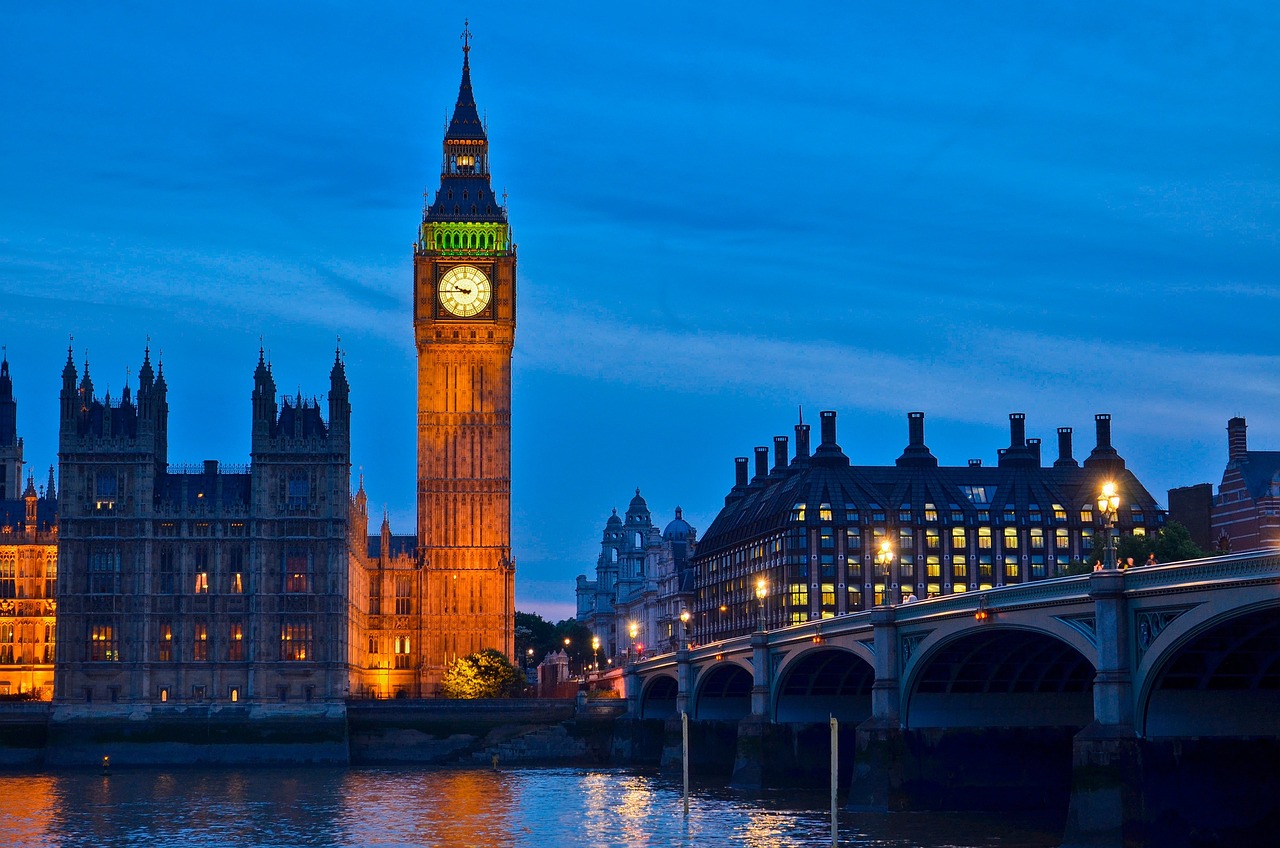
This section discusses how the figure of Big Brother embodies the loss of privacy and individual autonomy.
In George Orwell's 1984, the figure of Big Brother stands as a chilling representation of the totalitarian regime's grip on society. He is not merely a character; he is a symbol of the omnipresent surveillance that infiltrates every aspect of life. The notion of Big Brother watching you serves as a constant reminder that privacy is an illusion, and individual autonomy is a relic of the past. Imagine living in a world where every whisper, every thought, and every action is monitored. It’s like having a shadow that never leaves your side, always watching, always judging.
The very existence of Big Brother embodies the erosion of personal freedom. Citizens are conditioned to believe that their lives are not their own, but rather extensions of the Party's will. This pervasive control creates a culture of fear and compliance, where individuals suppress their true selves to avoid the wrath of a watchful authority. The implications are profound: when people feel they are constantly being observed, they begin to self-censor, altering their behavior to fit what they perceive to be acceptable. This leads to a society where genuine thoughts and feelings are buried beneath layers of conformity and deceit.
Furthermore, the slogan "Big Brother is watching you" reinforces the idea that individuality is not just discouraged but actively punished. The Party's propaganda instills a sense of paranoia among the populace, making them believe that even their innermost thoughts are subject to scrutiny. In this way, Big Brother becomes the ultimate enforcer of loyalty and obedience, ensuring that dissent is not only unheard but unthought. The loss of privacy is not just a physical absence; it is a psychological state that transforms how individuals interact with one another.
To illustrate the extent of this control, consider the following table that outlines the various ways in which Big Brother infiltrates daily life in 1984:
| Aspect of Life | Impact of Big Brother |
|---|---|
| Personal Relationships | Trust is eroded; individuals fear betrayal. |
| Freedom of Expression | Self-censorship becomes the norm. |
| Thoughts and Beliefs | Conformity replaces individuality. |
| Social Interactions | People become wary of expressing true feelings. |
The psychological manipulation exerted by Big Brother is further exacerbated by the Party's relentless propaganda. Citizens are bombarded with messages that glorify the Party and demonize any form of dissent. This creates a warped reality where loyalty to the Party is equated with loyalty to one’s own identity. The individual becomes a mere cog in the machine, stripped of the ability to think critically or act independently.
In conclusion, the figure of Big Brother in 1984 serves as a powerful metaphor for the loss of privacy and individual autonomy. His omnipresence instills fear, stifles individuality, and transforms society into a landscape of conformity. It compels us to reflect on our own realities and the delicate balance between security and freedom. As we navigate our increasingly monitored world, the lessons from Orwell's dystopia resonate more than ever, prompting us to question: at what cost do we surrender our privacy?

Psychological Manipulation
In George Orwell's 1984, the Party employs a range of psychological manipulation techniques that are as insidious as they are effective. These methods serve not only to control the populace but also to warp their perceptions of reality, creating a society where independent thought is virtually impossible. Imagine living in a world where your thoughts are not your own, where the very act of thinking becomes a dangerous game of survival. This is the grim reality for the citizens of Oceania, where the Party's influence seeps into every aspect of life.
One of the most potent tools of psychological manipulation in 1984 is fear. The Party instills a deep-seated terror of dissent, making citizens acutely aware that any deviation from the norm could lead to dire consequences. This fear is not just about physical punishment; it extends to the psychological toll of being constantly watched and judged. The omnipresence of Big Brother creates an environment where individuals self-censor their thoughts and behaviors, leading to a culture of paranoia. People begin to question their own memories and beliefs, as the Party's propaganda convinces them that their perceptions are flawed.
Another significant aspect of psychological manipulation is the use of propaganda. The Party inundates citizens with a barrage of slogans and messages designed to shape their worldview. Phrases like "War is Peace," "Freedom is Slavery," and "Ignorance is Strength" become ingrained in the collective consciousness, serving to confuse and control the populace. This manipulation of language is not merely a tool for communication; it is a weapon that alters the very fabric of thought. Through the strategic use of language, the Party can redefine reality, making it difficult for individuals to challenge or even recognize the oppressive structures surrounding them.
Moreover, indoctrination plays a crucial role in the Party's psychological strategy. From a young age, citizens are subjected to intense propaganda that glorifies the Party and vilifies dissent. Schools become breeding grounds for loyalty, where children are taught to love Big Brother and view any opposition as a threat to their very existence. This early indoctrination ensures that citizens grow up with a skewed understanding of loyalty and truth, making them more susceptible to the Party's manipulative tactics.
To illustrate the impact of these psychological strategies, consider the following table that summarizes the main methods of psychological manipulation used by the Party in 1984:
| Method | Description |
|---|---|
| Fear | Instilling terror of punishment to deter dissent and encourage self-censorship. |
| Propaganda | Using slogans and manipulated language to control thought and redefine reality. |
| Indoctrination | Teaching loyalty to the Party from a young age to ensure compliance. |
In conclusion, the psychological manipulation employed by the Party in 1984 is a chilling reminder of how power can distort reality and suppress individual autonomy. By instilling fear, utilizing propaganda, and enforcing indoctrination, the Party creates a populace that is not only compliant but also incapable of questioning the very foundations of their existence. It raises the question: how easily can our own beliefs and perceptions be manipulated in the face of overwhelming authority?
- What is psychological manipulation in 1984? It refers to the strategies used by the Party to control thoughts and behaviors of individuals through fear, propaganda, and indoctrination.
- How does fear play a role in the Party's control? Fear is used to deter dissent and encourage self-censorship, making individuals afraid to express their true thoughts.
- What is the significance of propaganda in 1984? Propaganda manipulates language and reality, making it difficult for citizens to challenge the Party's narrative.
- How does indoctrination affect children in 1984? Children are taught to love the Party and view dissent as a threat, ensuring loyalty from a young age.

Impact on Relationships
In George Orwell's 1984, the impact of the Party's oppressive regime extends far beyond mere governance; it seeps into the very fabric of personal relationships. Imagine living in a world where your every word, gesture, and thought is monitored—how would that affect your ability to connect with others? The Party's relentless surveillance creates an atmosphere of fear and distrust, effectively dismantling the bonds of love, friendship, and even familial ties.
Consider the character of Winston Smith, who yearns for genuine connection in a society that thrives on isolation. His relationship with Julia is a poignant example of how the Party's control disrupts intimacy. They find solace in each other, yet their love is fraught with the knowledge that it is ultimately a rebellion against the Party's dictates. The constant threat of betrayal looms over them, highlighting how the Party's influence erodes trust among individuals. In a world where loyalty to Big Brother supersedes personal loyalty, relationships become transactional, built on fear rather than genuine affection.
The Party's tactics not only manipulate public perception but also infiltrate the private lives of citizens. For instance, children are indoctrinated to report on their parents, turning familial bonds into potential sources of betrayal. This manipulation fosters an environment where individuals are pitted against one another, undermining the very essence of human connection. As a result, relationships become frail and superficial, driven by the need for self-preservation rather than love or camaraderie.
Furthermore, the concept of Newspeak plays a significant role in stifling emotional expression. By limiting the language available to express complex feelings, the Party effectively diminishes the capacity for deep emotional connections. When words like "love" or "trust" are stripped of their meaning, how can relationships flourish? This linguistic manipulation serves as a tool for the Party to maintain control, ensuring that citizens cannot articulate their dissent or dissatisfaction, further isolating them from one another.
In summary, the impact of the Party's surveillance and control on relationships in 1984 is profound. It fosters an environment of fear, distrust, and emotional repression, effectively dismantling the bonds that hold individuals together. The characters in Orwell's dystopia serve as a chilling reminder of how authoritarian regimes can infiltrate the most personal aspects of life, transforming love into a weapon of the state.
- How does surveillance affect personal relationships in 1984? Surveillance creates an atmosphere of fear and distrust, leading to superficial connections and the erosion of genuine intimacy.
- What role does language play in relationships? The manipulation of language, particularly through Newspeak, limits emotional expression, making it difficult for individuals to form deep connections.
- Are there any positive relationships depicted in the novel? While relationships like Winston and Julia's exist, they are fraught with tension and ultimately doomed by the Party's control.
- How does the Party manipulate familial relationships? The Party encourages children to betray their parents, turning family bonds into potential sources of betrayal and mistrust.

1984.
This article explores the intricate themes of dystopia in George Orwell's seminal work, 1984, examining its philosophical implications on society, freedom, and the nature of truth.
Dystopia, a term frequently associated with Orwell's 1984, describes a society characterized by oppressive control and a loss of individuality. This section delves into the defining features of dystopian literature. A dystopian society is often marked by a totalitarian regime, where the government exerts extreme control over every aspect of life. Here, citizens are stripped of their autonomy, living under the constant threat of surveillance and punishment. The bleakness of such a world serves as a warning, urging readers to reflect on their own realities and the importance of safeguarding freedom and individuality.
Surveillance is a cornerstone of the oppressive regime in 1984. This subheading analyzes how constant monitoring affects personal freedom and the psychology of citizens under totalitarian rule. Imagine living in a world where your every move is watched, where even your thoughts are subject to scrutiny. In Orwell's vision, the Party employs advanced technology to ensure that no one can escape its gaze. This omnipresent surveillance creates a culture of fear, compelling individuals to conform to the Party's expectations. As a result, personal freedoms are sacrificed at the altar of security, leading to a society where trust is a rare commodity.
Big Brother symbolizes the omnipresent government in 1984. This section discusses how the figure of Big Brother embodies the loss of privacy and individual autonomy. With his watchful eyes and propaganda plastered across the city, Big Brother becomes a figure of both fear and reverence. Citizens are conditioned to believe that their loyalty to him is paramount, leading to a chilling acceptance of their own subjugation. The concept of Big Brother serves not only as a literal overseer but also as a metaphor for the invasive nature of government control in our lives.
The Party employs psychological tactics to maintain control. This subheading explores methods like fear, propaganda, and indoctrination used to manipulate the populace's thoughts and beliefs. The use of slogans like "War is Peace" and "Freedom is Slavery" illustrates how language can be twisted to serve the interests of the ruling class. Through relentless propaganda, the Party instills a sense of hopelessness and dependency among the populace, making it nearly impossible for individuals to envision a life outside the Party's grasp. This manipulation of reality not only keeps citizens in line but also erodes their ability to think critically.
Surveillance and control disrupt personal relationships in 1984. This section examines how the Party's influence erodes trust and intimacy among individuals. In a world where everyone is a potential informant, genuine connections become fraught with suspicion and fear. The Party's intrusion into personal lives leads to a breakdown of familial bonds and friendships, as individuals prioritize their own safety over loyalty to one another. The emotional isolation experienced by characters like Winston and Julia highlights the devastating effects of a society governed by fear.
In 1984, language is manipulated to limit thought. This subheading discusses the concept of Newspeak and its implications for freedom of expression and critical thinking. Newspeak is not just a new language; it’s a tool designed to eliminate the possibility of rebellious thoughts. By reducing the complexity of language, the Party aims to restrict the range of thoughts that individuals can conceive. The phrase "If thought corrupts language, language can also corrupt thought" encapsulates the insidious nature of this manipulation, showing how language shapes our understanding of reality.
Truth is a central theme in 1984, where the Party controls reality. This section investigates the philosophical implications of truth and its malleability under totalitarian regimes. In a world where "the past was dead, the future was unimaginable," the Party's control over truth creates a society where reality is subjective and manipulated. Citizens are forced to accept the Party's version of reality, leading to a profound disconnection from objective truth.
The Party's alteration of history serves to control the narrative. This subheading analyzes the effects of historical revisionism on collective memory and identity. By constantly rewriting history, the Party ensures that its version of events is the only one that exists. This manipulation of the past not only shapes the present but also influences how individuals perceive their identity and place within society. The phrase "Who controls the past controls the future" serves as a chilling reminder of the power dynamics at play.
Doublethink is a crucial concept in 1984, allowing individuals to accept contradictory beliefs. This section explores how doublethink facilitates compliance and acceptance of the Party's doctrines. In essence, doublethink enables citizens to hold two opposing ideas in their minds simultaneously, allowing them to navigate the complexities of life under the Party’s rule. This cognitive dissonance breeds a sense of helplessness, as individuals become incapable of questioning the very foundations of their reality.
- What is the main theme of 1984? The main theme of 1984 revolves around the dangers of totalitarianism, the manipulation of truth, and the loss of individuality.
- How does surveillance affect the characters in 1984? Surveillance creates a culture of fear, leading to mistrust and emotional isolation among characters.
- What is Newspeak and why is it important? Newspeak is a controlled language designed to limit free thought and expression, making rebellion against the Party nearly impossible.
- What does Big Brother symbolize? Big Brother symbolizes the oppressive government and the loss of privacy and autonomy in a totalitarian regime.

This section examines how the Party's influence erodes trust and intimacy among individuals.
In George Orwell's 1984, the Party's pervasive influence acts like a corrosive agent, eroding the very fabric of trust and intimacy among individuals. Imagine living in a world where every glance, every whisper, and every thought is scrutinized under the watchful eyes of Big Brother. This constant surveillance creates an atmosphere of paranoia, where people are more likely to betray their loved ones than to share their innermost feelings. The Party's doctrine promotes the idea that loyalty to the state must come before loyalty to family and friends, fundamentally altering the dynamics of personal relationships.
With the Party's ideology deeply ingrained in society, individuals are conditioned to view each other as potential informants. Trust becomes a rare commodity, and intimacy is sacrificed at the altar of self-preservation. For instance, the relationship between Winston and Julia serves as a poignant example of how the Party's influence disrupts genuine connections. Despite their passionate love affair, both characters are acutely aware that their bond is built on a shaky foundation of secrecy and fear. The moment they step outside their private world, they are thrust back into a reality where betrayal looms large, and their love is rendered fragile.
The Party's relentless propaganda further exacerbates this erosion of trust. Through slogans like "War is Peace" and "Freedom is Slavery," the regime instills a sense of confusion that makes it difficult for individuals to discern truth from falsehood. This manipulation of reality leads to a collective sense of disorientation, where people are unsure of whom to trust — including themselves. In such a climate, even the most intimate relationships can become transactional, driven by fear rather than genuine affection.
Moreover, the Party's control extends to personal thoughts and feelings through psychological manipulation. The concept of thoughtcrime serves as a constant reminder that even one's private thoughts can be dangerous. This fear of being caught thinking the "wrong" thing creates a chasm between individuals, as they are compelled to hide their true selves. The very act of sharing a personal belief or emotion becomes fraught with risk, leading to a society where people wear masks instead of showing their authentic selves.
In summary, the Party's influence in 1984 systematically dismantles trust and intimacy among individuals. By fostering an environment of fear, suspicion, and psychological manipulation, the regime ensures that personal relationships are overshadowed by the omnipresent threat of betrayal. The result is a society where love and loyalty are replaced by self-interest and survival, highlighting the profound impact of totalitarianism on human connection.
- What is the main theme of 1984? The main theme of 1984 revolves around the dangers of totalitarianism, including the erosion of truth, freedom, and individualism.
- How does the Party control its citizens? The Party controls its citizens through constant surveillance, propaganda, and psychological manipulation, creating an atmosphere of fear and distrust.
- What role does language play in 1984? Language in 1984 is manipulated through Newspeak to limit thought and expression, reinforcing the Party's control over reality.
- What is doublethink? Doublethink is the ability to hold two contradictory beliefs simultaneously, allowing individuals to accept the Party's doctrines without question.

Language as Control
In George Orwell's 1984, language is not merely a means of communication; it is a powerful tool wielded by the Party to exert control over the populace. The concept of Newspeak exemplifies this manipulation, as it is designed to limit the range of thought by reducing the complexity of language. Imagine trying to express a profound idea using only a handful of words; that's the essence of Newspeak. By systematically eliminating words that convey rebellion or dissent, the Party effectively narrows the citizens' ability to think critically and challenge the status quo.
The implications of this linguistic control are staggering. By stripping away the vocabulary necessary for expressing subversive thoughts, the Party ensures that the very notion of rebellion becomes unthinkable. It's like trying to solve a puzzle with missing pieces; without the right words, ideas become muddled and indistinct. The Party's ultimate goal is to create a society where the very concept of freedom is foreign, and the citizens are left with nothing but the Party's approved phrases and slogans.
Furthermore, the manipulation of language extends beyond mere vocabulary. The Party employs a technique known as doublethink, which allows individuals to hold two contradictory beliefs simultaneously. This cognitive dissonance is a direct result of linguistic control, as it enables the Party to dictate what is true and what is false. For example, slogans like "War is Peace," "Freedom is Slavery," and "Ignorance is Strength" serve as prime examples of how language can be twisted to serve the interests of those in power. The citizens, indoctrinated to accept these paradoxes, find themselves trapped in a web of contradictions, making it nearly impossible to question the Party's authority.
To illustrate the impact of language as a means of control, consider the following table that outlines the key features of Newspeak:
| Feature | Description |
|---|---|
| Vocabulary Reduction | Elimination of words that express dissent or rebellion. |
| Simplification | Creation of simplified terms that replace complex ideas. |
| Destruction of Synonyms | Removal of synonyms to limit nuanced expression. |
| Promotion of Party Ideology | Encouragement of phrases that reinforce Party beliefs. |
In conclusion, the control of language in 1984 serves as a chilling reminder of how those in power can manipulate communication to shape reality. By limiting the citizens' ability to articulate their thoughts and feelings, the Party not only controls their actions but also their very understanding of existence. As readers, we are left to ponder: how much of our own language is shaped by external influences? Are we, too, at risk of losing the freedom to think and express ourselves?
- What is Newspeak? Newspeak is the official language of the Party in 1984, designed to restrict freedom of thought.
- How does language control thought? By limiting vocabulary, the Party prevents citizens from expressing rebellious ideas, effectively controlling their thoughts.
- What is doublethink? Doublethink is the ability to accept two contradictory beliefs simultaneously, a concept heavily utilized by the Party to maintain control.
- Can language shape reality? Yes, language can influence perceptions and beliefs, making it a powerful tool for those in authority.

1984,
This article explores the intricate themes of dystopia in George Orwell's seminal work, 1984, examining its philosophical implications on society, freedom, and the nature of truth.
Dystopia, a term frequently associated with Orwell's 1984, describes a society characterized by oppressive control and a loss of individuality. In this dark narrative, we see a world where the government exerts its power over every aspect of life, creating an environment where freedom is merely a distant memory. The defining features of dystopian literature often include:
- Authoritarian Regimes: A central authority that suppresses dissent and controls the populace.
- Surveillance: Constant monitoring of citizens to maintain control and prevent rebellion.
- Loss of Individuality: Citizens are stripped of personal identities, becoming mere cogs in a vast machine.
- Manipulation of Truth: The government distorts reality to maintain its power over the people.
Through these elements, Orwell crafts a chilling portrayal of a future where humanity is subjugated, prompting readers to reflect on their own society and the potential for similar dystopian outcomes.
Surveillance is a cornerstone of the oppressive regime in 1984. The omnipresent gaze of the Party, embodied by the figure of Big Brother, creates a sense of paranoia among citizens. Imagine living in a world where every whisper, every fleeting thought, is monitored and scrutinized. This constant oversight affects personal freedom, stifling creativity and individuality. People become mere shadows of their former selves, always conforming to the expectations set by their overseers.
Big Brother symbolizes the omnipresent government in 1984. His image is everywhere, serving as a constant reminder of the Party's power and control. The slogan "Big Brother is watching you" echoes through the minds of citizens, instilling a deep-seated fear that discourages rebellion. The loss of privacy is profound; individuals are no longer able to express their true thoughts or feelings, leading to a society where trust is a scarce commodity.
The Party employs psychological tactics to maintain control. Fear is a powerful weapon, and the Party wields it expertly to manipulate the populace. Through propaganda, citizens are bombarded with messages that reinforce the Party's ideology, while indoctrination ensures that dissenting thoughts are extinguished before they can blossom. The result is a society where individuals accept their oppression without question, trapped in a cycle of compliance.
Surveillance and control disrupt personal relationships in 1984. The Party's influence erodes trust and intimacy among individuals, turning friends into informants and lovers into strangers. People are conditioned to view one another with suspicion, as any sign of disloyalty could lead to dire consequences. This pervasive atmosphere of distrust leads to a profound loneliness, stripping away the very essence of human connection.
In 1984, language is manipulated to limit thought. The concept of Newspeak is introduced as a tool for the Party to control how people think and communicate. By reducing the complexity of language, the Party aims to eliminate the possibility of rebellious thoughts. Imagine a world where words are stripped of their meaning, where the very tools of expression are weaponized against you. This linguistic control has dire implications for freedom of expression and critical thinking, as individuals become unable to articulate dissenting ideas.
Truth is a central theme in 1984, where the Party controls reality. The malleability of truth under totalitarian regimes raises profound philosophical questions. In a society where the government dictates what is real, how can individuals discern fact from fiction? The Party's manipulation of truth serves not only to maintain power but also to create a population that is unable to question its own beliefs.
The Party's alteration of history serves to control the narrative. By continuously rewriting the past, the government shapes collective memory and identity. This historical revisionism creates a populace that is disconnected from its own heritage, making it easier for the Party to manipulate its citizens. Without a shared understanding of history, individuals become more susceptible to the Party's propaganda, leading to a society that is blind to its own oppression.
Doublethink is a crucial concept in 1984, allowing individuals to accept contradictory beliefs. It is a mental gymnastics that enables compliance with the Party's doctrines while simultaneously holding onto personal truths. This cognitive dissonance is a powerful tool for the Party, as it fosters a culture of confusion and submission. The ability to accept two opposing ideas as true is essential for survival in a world where reality is constantly shifting.
- What is the main theme of 1984? The main theme revolves around the dangers of totalitarianism, the loss of individuality, and the manipulation of truth.
- How does surveillance impact society in the novel? Surveillance creates an atmosphere of fear and distrust, eroding personal freedoms and relationships.
- What is Newspeak? Newspeak is a controlled language designed to limit freedom of thought and expression.
- What is the significance of Big Brother? Big Brother represents the oppressive government and the loss of privacy and individual autonomy.

language is manipulated to limit thought. This subheading discusses the concept of Newspeak and its implications for freedom of expression and critical thinking.
This article explores the intricate themes of dystopia in George Orwell's seminal work, 1984, examining its philosophical implications on society, freedom, and the nature of truth.
Dystopia, a term frequently associated with Orwell's 1984, describes a society characterized by oppressive control and a loss of individuality. This section delves into the defining features of dystopian literature.
Surveillance is a cornerstone of the oppressive regime in 1984. This subheading analyzes how constant monitoring affects personal freedom and the psychology of citizens under totalitarian rule.
Big Brother symbolizes the omnipresent government in 1984. This section discusses how the figure of Big Brother embodies the loss of privacy and individual autonomy.
The Party employs psychological tactics to maintain control. This subheading explores methods like fear, propaganda, and indoctrination used to manipulate the populace's thoughts and beliefs.
Surveillance and control disrupt personal relationships in 1984. This section examines how the Party's influence erodes trust and intimacy among individuals.
In 1984, language is manipulated to limit thought. This subheading discusses the concept of Newspeak and its implications for freedom of expression and critical thinking.
Newspeak, the official language of the Party, serves a dual purpose: it simplifies communication and, more insidiously, restricts the range of thoughts that can be expressed. By systematically reducing the vocabulary available to the populace, the Party aims to eliminate any possibility of rebellious thoughts—an idea encapsulated in the phrase, "If you can’t say it, you can’t think it." Imagine trying to express a complex emotion or a nuanced opinion with a vocabulary so limited that the very words to articulate your feelings simply do not exist. This is the chilling reality that Newspeak creates.
The implications of Newspeak extend beyond mere vocabulary; they highlight a profound philosophical concern regarding freedom of expression. As the Party narrows the language, it simultaneously narrows the scope of human thought. For instance, consider the following:
| Original Word | Newspeak Equivalent | Implication |
|---|---|---|
| Revolution | Rebel | Suggests a personal act rather than a collective movement. |
| Freedom | Unfreedom | Reduces the concept to a negative state, eliminating positive connotations. |
| Thoughtcrime | Thoughtcrime | Creates a fear of even the idea of dissent. |
This manipulation of language serves not only to control but also to create a sense of compliance among the citizens. When language is stripped of its richness, critical thinking becomes a daunting challenge. People find themselves unable to articulate their dissent, leading to a society that is not only repressed but also deprived of the tools necessary for questioning authority.
Moreover, the concept of Newspeak raises questions about the nature of truth. If language shapes our reality, what happens when that language is engineered by a totalitarian regime? The Party's control over language is a direct assault on individual thought, leading to a populace that is not just oppressed but also indoctrinated into accepting the Party's version of reality without question.
In conclusion, the manipulation of language in 1984 serves as a powerful reminder of how critical language is to our identity and freedom. It forces us to consider: what would happen if we allowed our words to be dictated by those in power? Would we still be able to think freely, or would we become mere vessels for the thoughts that others want us to have?
Truth is a central theme in 1984, where the Party controls reality. This section investigates the philosophical implications of truth and its malleability under totalitarian regimes.
The Party's alteration of history serves to control the narrative. This subheading analyzes the effects of historical revisionism on collective memory and identity.
Doublethink is a crucial concept in 1984, allowing individuals to accept contradictory beliefs. This section explores how doublethink facilitates compliance and acceptance of the Party's doctrines.
- What is Newspeak? Newspeak is the official language of the Party in 1984, designed to limit freedom of thought and expression.
- How does language control thought? By reducing vocabulary, Newspeak restricts the ability to articulate dissenting ideas, thereby controlling thought itself.
- What are the implications of Newspeak for society? Newspeak creates a populace that is unable to think critically or question authority, leading to greater control by the Party.

The Nature of Truth
Truth is a central theme in George Orwell's 1984, where the Party exerts its power by controlling not just actions but also the very reality that individuals perceive. In a world where the line between reality and illusion is blurred, the concept of truth becomes a weapon of oppression. The Party’s slogan, “War is peace. Freedom is slavery. Ignorance is strength,” encapsulates the paradoxical nature of truth within this dystopian society. This manipulation creates a reality where individuals are forced to accept the Party's version of events, leading to a profound disconnection from objective reality.
At the heart of this manipulation lies the Party's ability to redefine truth at will. By controlling information, they ensure that the populace remains in a state of confusion and dependency. The idea that "who controls the past controls the future; who controls the present controls the past" illustrates how the Party rewrites history to maintain its grip on power. This historical revisionism not only shapes the collective memory but also impacts personal identities, as individuals struggle to reconcile their memories with the Party’s narrative. The constant alteration of facts leads to a society where trust in one’s own thoughts becomes a rarity.
In 1984, the Party engages in systematic historical revisionism to fabricate a narrative that serves its interests. This process involves the alteration of historical records, newspapers, and even photographs to ensure that the Party appears infallible. For example, if a party member is purged, all evidence of their existence is erased from history. This creates a chilling effect on the populace, who learn to doubt their own memories and perceptions. The result is a society where the past is malleable, and individuals are left questioning what is true.
The implications of this are staggering. When history is rewritten, the collective identity of the society is reshaped. People become disconnected from their past, which in turn makes them more susceptible to the Party’s propaganda. The ability to manipulate the past allows the Party to justify its current actions and policies, fostering a culture of compliance and fear. As a result, individuals find themselves trapped in a reality dictated by the Party, where their understanding of truth is not based on facts but on what they are told to believe.
Another crucial concept in 1984 is doublethink, the ability to hold two contradictory beliefs simultaneously and accept both as true. This cognitive dissonance is a tool used by the Party to enforce its ideology and maintain control over the populace. Through doublethink, individuals can convince themselves that the Party is always right, even when faced with overwhelming evidence to the contrary. This mental gymnastics allows the Party to operate without challenge, as citizens become adept at rationalizing the absurdities of their reality.
Doublethink serves as a psychological mechanism that enables compliance. It creates a scenario where individuals are not only accepting the Party's version of truth but are also actively participating in their own oppression. The consequences of doublethink are profound; it leads to a society where critical thinking is extinguished, and blind loyalty to the Party becomes the norm. In this way, the nature of truth in Orwell's 1984 is not merely a philosophical inquiry but a fundamental aspect of the Party's strategy for domination.
In conclusion, the nature of truth in 1984 serves as a stark reminder of the power of language and information in shaping reality. As the Party manipulates truth through historical revisionism and doublethink, it creates a society that is both compliant and confused. Orwell's exploration of these themes prompts us to reflect on our own relationship with truth in an age where misinformation can spread like wildfire. Are we, too, living in a reality shaped by those who control the narrative? The answer may lie in our willingness to question and seek out the truth.
- What is the significance of truth in 1984?
Truth in 1984 is manipulated by the Party to control the populace, illustrating the dangers of totalitarian regimes. - How does historical revisionism affect society?
Historical revisionism creates a disconnection from the past, leading to a society that is more easily manipulated. - What is doublethink?
Doublethink is the ability to accept contradictory beliefs, allowing individuals to rationalize the Party's absurdities.

1984,
This article explores the intricate themes of dystopia in George Orwell's seminal work, 1984, examining its philosophical implications on society, freedom, and the nature of truth.
Dystopia, a term frequently associated with Orwell's 1984, describes a society characterized by oppressive control and a loss of individuality. In this bleak world, the government exerts totalitarian power over its citizens, stripping away their rights and freedoms. Dystopian literature often serves as a cautionary tale, warning readers of the potential consequences of unchecked governmental authority. The defining features of such literature include:
- Oppression: Citizens live under constant surveillance and fear, with little to no personal freedom.
- Loss of Individuality: The state suppresses personal identities, forcing conformity among the populace.
- Manipulation of Truth: The government alters reality to maintain its power, creating a world where objective truth is obscured.
Surveillance is a cornerstone of the oppressive regime in 1984. The omnipresent eyes of the Party, symbolized by Big Brother, watch every move of the citizens. This constant monitoring creates an atmosphere of paranoia, where individuals are acutely aware that their actions could be scrutinized at any moment. The psychological impact of such surveillance is profound, as it not only restricts personal freedom but also alters the way people behave. Citizens become prisoners of their own minds, curbing their thoughts and actions out of fear of retribution.
Big Brother symbolizes the omnipresent government in 1984. The figure embodies the loss of privacy and individual autonomy, serving as a constant reminder that the Party is always watching. The slogan "Big Brother is Watching You" encapsulates the essence of this control, creating a culture of fear where dissent is not only discouraged but also dangerous. This pervasive influence leads to a society where personal relationships are strained, and trust becomes a rare commodity. In a world where loyalty to the Party supersedes loyalty to one another, genuine connections are nearly impossible.
The Party employs psychological tactics to maintain control over its citizens. Through fear, propaganda, and indoctrination, the government manipulates the populace's thoughts and beliefs. Fear acts as a powerful tool, keeping individuals in line through the threat of punishment or retribution. Propaganda saturates every aspect of life, with slogans and messages that reinforce the Party's ideology. Indoctrination begins at a young age, ensuring that citizens grow up accepting the Party's version of reality without question. Such manipulation creates a populace that is not only compliant but also deeply unaware of their own oppression.
Surveillance and control disrupt personal relationships in 1984. The Party's influence erodes trust and intimacy among individuals, fostering an environment where betrayal is commonplace. Friends and family members are often pitted against each other, as the fear of being reported to the Thought Police looms large. This breakdown of personal connections leads to a society where emotional bonds are weakened, making it easier for the Party to maintain its grip on power. In such a world, love and loyalty are sacrificed at the altar of survival, leaving individuals isolated and vulnerable.
In 1984, language is manipulated to limit thought. The concept of Newspeak illustrates how the Party seeks to control not just what people say but also how they think. By reducing the complexity of language, the Party aims to eliminate the possibility of rebellious thoughts—if there are no words to express dissent, then dissent itself becomes impossible. This linguistic control is a powerful mechanism that highlights the connection between language and freedom of expression. The implications for critical thinking are dire, as citizens are left with a vocabulary that restricts their ability to question or challenge the Party's doctrines.
Truth is a central theme in 1984, where the Party controls reality. The manipulation of truth raises profound philosophical questions about the nature of reality itself. If the government can dictate what is true, then what does that mean for individual perception and understanding? In this dystopian world, truth becomes a malleable concept, shaped by the whims of those in power. The implications of this manipulation extend beyond mere propaganda; they touch upon the very essence of human experience.
The Party's alteration of history serves to control the narrative. By constantly rewriting the past, the Party ensures that its version of events is the only one that exists. This historical revisionism has significant effects on collective memory and identity, as citizens are left with a distorted understanding of their own history. The past becomes a tool of oppression, used to justify the Party's actions and maintain its authority. In a world where history is fluid, individuals struggle to form a coherent sense of self, making them more susceptible to the Party's influence.
Doublethink is a crucial concept in 1984, allowing individuals to accept contradictory beliefs. This cognitive dissonance is essential for the Party's control, as it enables citizens to reconcile the conflicting messages they receive. By practicing doublethink, individuals can simultaneously believe in the Party's propaganda while also recognizing its absurdities. This mental gymnastics facilitates compliance and acceptance of the Party's doctrines, creating a populace that is not only obedient but also deeply confused.
- What is the main theme of 1984? The main theme revolves around the dangers of totalitarianism, surveillance, and the manipulation of truth.
- How does Big Brother control the citizens? Big Brother controls citizens through constant surveillance, psychological manipulation, and the suppression of individual thought.
- What is Newspeak? Newspeak is the official language of the Party, designed to limit freedom of thought and expression.
- What is doublethink? Doublethink is the ability to hold two contradictory beliefs simultaneously, a crucial concept for maintaining loyalty to the Party.

where the Party controls reality. This section investigates the philosophical implications of truth and its malleability under totalitarian regimes.
In George Orwell's 1984, the concept of truth is not just a matter of fact; it is a weapon wielded by the Party to maintain its grip on power. The Party's manipulation of reality raises profound philosophical questions about the nature of truth itself. What happens when a government has the authority to dictate what is true? This is not just a dystopian nightmare; it is a chilling reflection of how totalitarian regimes can distort reality to serve their ends. In this world, truth becomes malleable, reshaped by the Party's whims.
The Party's control over reality is most vividly illustrated through its use of propaganda and historical revisionism. By constantly altering facts and erasing inconvenient truths, the Party ensures that the populace remains in a state of confusion. This leads to a society where individuals struggle to trust their own memories. Imagine living in a world where you can't even rely on the past to inform your present. This is the psychological landscape that Orwell paints, where the Party's version of reality is the only one that exists. The implications are staggering: if truth can be manipulated, then freedom, individuality, and even sanity are at risk.
One of the most chilling aspects of the Party's control is its ability to create a new language, Newspeak, designed to eliminate the very possibility of rebellious thoughts. By reducing the complexity of language, the Party aims to limit the range of thought itself. If you can’t articulate dissent, can you truly think it? This is a fundamental philosophical dilemma that Orwell explores. The erosion of language not only restricts communication but also undermines the very foundation of critical thinking and personal expression.
Moreover, the concept of doublethink plays a crucial role in how the Party maintains its narrative. Doublethink allows individuals to accept two contradictory beliefs simultaneously, effectively blurring the lines of reality. For instance, the Party can declare that "War is Peace," and citizens are expected to accept this paradox without question. This cognitive dissonance is a powerful tool for compliance, as it enables the Party to manipulate the populace's understanding of truth without them even realizing it.
In a society where the Party controls reality, the implications extend beyond individual thought. Collective memory is altered, and with it, the identity of the society itself. The past is rewritten to fit the present narrative, leading to a populace that is not only confused but also disempowered. When history is fluid, how can a society learn from its mistakes? How can it foster a sense of identity or community? These questions linger in the air, unanswered, as the Party continues its relentless march toward absolute control.
Ultimately, the philosophical implications of truth in 1984 serve as a cautionary tale for our own society. The manipulation of truth is not merely a fictional construct; it is a real threat that can emerge in any society that allows power to go unchecked. As we navigate our complex world filled with misinformation and conflicting narratives, Orwell's insights remind us of the importance of questioning authority and seeking out the truth, no matter how uncomfortable it may be.
- What is the main theme of truth in 1984? The main theme revolves around the Party's manipulation of truth to maintain control over the populace, illustrating how reality can be distorted under totalitarian regimes.
- How does Newspeak affect the characters in 1984? Newspeak limits the complexity of language, making it difficult for characters to express rebellious thoughts, ultimately stifling critical thinking and personal expression.
- What is doublethink and why is it important? Doublethink is the ability to hold two contradictory beliefs at once, which allows the Party to control the thoughts and beliefs of individuals, facilitating compliance with its doctrines.

Historical Revisionism
In George Orwell's 1984, the concept of historical revisionism is not just a narrative device; it is a fundamental mechanism of control wielded by the Party. The Party’s manipulation of history serves a dual purpose: it not only shapes the populace's understanding of their past but also ensures their present and future obedience. By rewriting history, the Party effectively creates a reality where its authority is unquestionable and its actions are always justified.
Imagine living in a world where every record, every book, and even every conversation is subject to alteration. This is the reality for the citizens of Oceania. The Ministry of Truth, where protagonist Winston Smith works, is dedicated to the continuous revision of historical facts. The Party's slogan, "Who controls the past controls the future; who controls the present controls the past," encapsulates this chilling philosophy. By erasing or altering historical events, the Party can manipulate collective memory, essentially rewriting society's narrative to fit its ever-changing agenda.
The impact of this revisionism on the citizens of Oceania is profound. It creates a sense of disorientation and confusion, as individuals struggle to discern what is true. When history is constantly rewritten, how can one trust their own memories? This leads to a populace that is not only compliant but also deeply skeptical of their own perceptions. The Party's control over historical narratives fosters a culture of doublethink, where contradictory beliefs coexist without conflict, allowing individuals to accept the Party's version of history without question.
To illustrate the extent of this manipulation, consider the following table that highlights key historical events and their altered versions as presented by the Party:
| Original Event | Party's Version |
|---|---|
| The Party's alliance with Eastasia | Never happened; always at war with Eastasia |
| The existence of the Brotherhood | A fabrication; it has always been a myth |
| The history of the revolution | Altered to show the Party as the sole liberators |
This table exemplifies how the Party's historical revisionism extends beyond mere facts; it reshapes the entire identity of the society. As citizens are bombarded with these altered narratives, they are stripped of their ability to form a coherent understanding of their own history. The result is a population that is not only disempowered but also utterly dependent on the Party for their understanding of reality.
Ultimately, the consequences of historical revisionism in 1984 highlight a crucial philosophical implication: when a government can control the past, it can effectively dictate the future. The citizens of Oceania live in a perpetual state of uncertainty, where the truth is malleable, and their memories are suspect. This manipulation of history serves as a stark warning about the fragility of truth in the hands of those in power, reminding us of the importance of preserving our collective memory and questioning the narratives we are presented with.
- What is historical revisionism? Historical revisionism refers to the act of reinterpreting the historical record, often to serve a specific agenda. In 1984, it is used as a tool for control by the Party.
- How does the Party control history in 1984? The Party controls history by altering records, documents, and even people’s memories to ensure that its version of events is the only one accepted.
- What is the significance of the slogan "Who controls the past controls the future"? This slogan emphasizes the Party's belief that by controlling historical narratives, it can shape the future and maintain its power over the present.

Doublethink Explained
Doublethink is one of the most intriguing and disturbing concepts presented in George Orwell's 1984. It refers to the ability to hold two contradictory beliefs simultaneously and accept both as true. Imagine trying to juggle two heavy balls at once; it takes a unique skill to keep them both in the air without dropping one. In the world of 1984, doublethink is a survival mechanism that allows citizens to navigate the oppressive regime of the Party while still maintaining a semblance of personal belief and identity.
The Party's mastery of doublethink is crucial for its control over the populace. By promoting the idea that "War is Peace," "Freedom is Slavery," and "Ignorance is Strength," the Party encourages individuals to accept these contradictions without question. This is not merely about denial; it's about a profound cognitive dissonance that becomes normalized within society. People learn to suppress their doubts and rationalize the absurd, enabling them to function within a reality dictated by the Party.
To illustrate how doublethink operates, consider the following examples:
- Acceptance of Contradictory Information: Citizens are taught to believe that the Party is infallible, even when evidence contradicts this belief. For instance, if the Party claims that the chocolate ration has increased, but personal experience tells a different story, individuals will dismiss their own experience in favor of the Party's assertion.
- Historical Revisionism: The Party constantly alters historical records to fit its current narrative. Doublethink allows people to accept these changes without question, as they have been conditioned to believe that the past is malleable and can be rewritten at will.
In essence, doublethink is a powerful tool of psychological manipulation. It not only facilitates compliance but also fosters a sense of belonging within the Party's ideology. Individuals who practice doublethink can navigate their lives without the burden of conflicting beliefs weighing them down. This phenomenon leads to a culture where critical thinking is stifled, and individuality is sacrificed on the altar of conformity.
Moreover, the implications of doublethink extend beyond the individual. When a society collectively embraces this cognitive dissonance, it creates an environment where truth becomes subjective. The Party's ability to control reality hinges on the populace's willingness to accept their version of truth, no matter how contradictory it may be. This manipulation of reality leads to a chilling effect on free thought and open dialogue, resulting in a populace that is easily governed and manipulated.
Ultimately, doublethink serves as a stark reminder of the fragility of truth in the face of authoritarianism. It raises essential questions about the nature of belief and the extent to which individuals can be conditioned to accept the unacceptable. In a world where doublethink reigns supreme, the line between reality and illusion blurs, leaving citizens trapped in a labyrinth of their own making.
- What is doublethink?
Doublethink is the ability to accept two contradictory beliefs at the same time, a concept crucial to the Party's control in 1984. - How does doublethink affect individuals?
It allows individuals to suppress doubts and rationalize absurdities, facilitating compliance with the Party's ideology. - Why is doublethink important for the Party?
Doublethink enables the Party to manipulate reality and maintain power by ensuring that citizens accept its contradictory narratives without question.

1984,
This article explores the intricate themes of dystopia in George Orwell's seminal work, 1984, examining its philosophical implications on society, freedom, and the nature of truth.
Dystopia, a term frequently associated with Orwell's 1984, describes a society characterized by oppressive control and a loss of individuality. In this bleak world, the government exerts totalitarian power, stripping away personal freedoms and enforcing conformity. The defining features of dystopian literature often include:
- Authoritarian Rule: A government that exercises extreme control over its citizens.
- Surveillance: Constant monitoring of individuals to ensure compliance.
- Loss of Individuality: The suppression of personal identity and expression.
- Manipulation of Truth: The alteration of facts to maintain the regime's power.
Orwell's 1984 serves as a chilling warning of the potential consequences of such a society, urging readers to reflect on the importance of freedom and individuality.
Surveillance is a cornerstone of the oppressive regime in 1984. The Party's omnipresent watchfulness creates an environment where citizens live in constant fear of being observed. This relentless monitoring affects personal freedom and the psychology of individuals under totalitarian rule. Imagine waking up every day knowing that your every move is being scrutinized; how would that shape your thoughts and actions?
Big Brother symbolizes the omnipresent government in 1984. His image is plastered everywhere, serving as a constant reminder of the Party's authority. The figure of Big Brother embodies the loss of privacy and individual autonomy, instilling a sense of helplessness among the populace. People are conditioned to believe that Big Brother is always watching, fostering a culture of self-censorship and compliance.
The Party employs psychological tactics to maintain control. Techniques such as fear, propaganda, and indoctrination are used to manipulate the populace's thoughts and beliefs. By creating an environment of uncertainty and anxiety, the Party ensures that citizens remain loyal and submissive. The use of slogans like “War is Peace” and “Freedom is Slavery” exemplifies the absurdity of their propaganda, forcing individuals to accept conflicting ideas as truth.
Surveillance and control disrupt personal relationships in 1984. The Party's influence erodes trust and intimacy among individuals, as everyone is wary of being reported for dissenting thoughts or actions. Friendships become strained, and love is tainted by suspicion. The Party's motto, “The family is the microcosm of the state,” illustrates how even the most personal bonds are manipulated to serve the regime's interests.
In 1984, language is manipulated to limit thought. The concept of Newspeak is introduced as a means to control the populace's ability to think critically and express dissent. By reducing the complexity of language, the Party aims to eliminate rebellious thoughts. The implications for freedom of expression are profound; if you cannot articulate a thought, can you truly have it? This linguistic control is a powerful tool in the Party's arsenal, demonstrating the intimate relationship between language and thought.
Truth is a central theme in 1984, where the Party controls reality. The philosophical implications of truth and its malleability under totalitarian regimes are explored in depth. In this world, the Party dictates what is true, often altering facts to suit its narrative. This manipulation raises critical questions about the nature of reality and the power dynamics involved in defining truth.
The Party's alteration of history serves to control the narrative. By continuously rewriting the past, the regime shapes collective memory and identity. Citizens are left with a fragmented understanding of their history, making it difficult to challenge the Party's authority. This historical revisionism is a stark reminder of how the control of information can influence societal beliefs and behaviors.
Doublethink is a crucial concept in 1984, allowing individuals to accept contradictory beliefs simultaneously. This cognitive dissonance facilitates compliance and acceptance of the Party's doctrines, effectively blurring the lines between reality and fiction. It’s as if the citizens are trapped in a mental maze, where the only way out is to embrace the absurdity of their circumstances.
- What is the main theme of 1984?
The main theme of 1984 revolves around the dangers of totalitarianism, the manipulation of truth, and the loss of individuality. - How does Orwell depict surveillance in 1984?
Orwell depicts surveillance as a pervasive force that controls every aspect of life, leading to a culture of fear and conformity. - What is Newspeak?
Newspeak is a language created by the Party to limit freedom of thought and expression, making rebellion impossible. - What does Big Brother represent?
Big Brother represents the oppressive government that watches over citizens, symbolizing the loss of privacy and personal autonomy.

allowing individuals to accept contradictory beliefs. This section explores how doublethink facilitates compliance and acceptance of the Party's doctrines.
Doublethink is a fascinating yet disturbing concept in George Orwell's 1984. It allows individuals to hold two contradictory beliefs simultaneously and accept both as true. This cognitive dissonance is not just a quirk of human psychology; it is a fundamental tool used by the Party to maintain control over the populace. Imagine living in a world where you are taught that freedom is slavery and ignorance is strength. These phrases are not mere slogans; they are the essence of doublethink, designed to confuse and manipulate the minds of citizens.
The implications of doublethink are profound. It creates a reality where individuals can be conditioned to accept the Party's doctrines without question. For example, if the Party declares that war is peace, citizens are expected to accept this notion, despite the apparent contradictions. This kind of mental gymnastics is not just encouraged; it is essential for survival in the oppressive regime of 1984.
Doublethink facilitates compliance in several ways:
- Psychological Comfort: By accepting contradictory beliefs, individuals can avoid the discomfort of cognitive dissonance. It allows them to live in a state of mental peace, even when faced with absurdities.
- Social Cohesion: When everyone in society embraces doublethink, it fosters a sense of unity. Individuals feel less isolated in their beliefs, as everyone around them shares the same paradoxical thinking.
- Resistance to Change: Doublethink makes it challenging for individuals to question the status quo. If a person can accept contradictory beliefs, they are less likely to challenge the Party's authority or seek out alternative truths.
Moreover, doublethink is a mechanism that the Party uses to rewrite history and control the present. The Party's ability to alter facts means that citizens must constantly adjust their beliefs to align with the latest propaganda. This constant flux makes it nearly impossible for individuals to form a coherent understanding of reality. In essence, doublethink becomes a survival strategy in a world where truth is malleable.
In conclusion, doublethink is not merely a concept but a crucial aspect of the Party's strategy to maintain power. By encouraging individuals to accept contradictory beliefs, the Party ensures that dissent is stifled, and compliance is achieved. The chilling reality is that doublethink is not just a fictional phenomenon; it reflects the potential for manipulation in any society where truth becomes a tool of control.
- What is doublethink? Doublethink is the ability to hold two contradictory beliefs at the same time and accept both as true, a key concept in Orwell's 1984.
- How does doublethink affect individuals? It creates a psychological comfort that allows individuals to avoid cognitive dissonance and fosters social cohesion by normalizing contradictory beliefs.
- Why is doublethink important for the Party? It helps the Party maintain control over the populace by making it difficult for individuals to question the Party's authority or seek alternative truths.
Frequently Asked Questions
- What is the main theme of George Orwell's 1984?
The primary theme of 1984 revolves around the dangers of totalitarianism and the oppressive control it exerts over individuals. Orwell illustrates how such regimes manipulate truth, suppress freedom, and strip away individuality, creating a society where personal autonomy is virtually non-existent.
- How does surveillance play a role in 1984?
Surveillance is a key element in 1984, represented by the ever-watchful figure of Big Brother. This constant monitoring instills fear and compliance among the citizens, leading them to self-censor their thoughts and actions. The pervasive surveillance creates a culture of paranoia, where individuals feel they are always being watched.
- What is the significance of Big Brother in the novel?
Big Brother symbolizes the omnipresent government and its absolute power over the populace. He represents the loss of privacy and individual autonomy, serving as a constant reminder that the Party is always in control. His image is used to instill fear and loyalty among citizens, reinforcing the idea that rebellion is futile.
- What psychological tactics does the Party use to maintain control?
The Party employs various psychological tactics, including fear, propaganda, and indoctrination, to manipulate the thoughts and beliefs of its citizens. By controlling information and instilling a sense of hopelessness, the Party effectively suppresses dissent and enforces loyalty among the populace.
- How does the Party's control affect personal relationships?
The Party's surveillance and oppressive control significantly disrupt personal relationships in 1984. Trust and intimacy are eroded, as individuals are conditioned to view each other with suspicion. This breakdown of personal connections serves to further isolate citizens, making them more reliant on the Party for their sense of identity and belonging.
- What is Newspeak and its purpose in the novel?
Newspeak is a language created by the Party to limit freedom of thought and expression. By reducing the complexity of language, the Party aims to eliminate any possibility of rebellious thoughts, effectively controlling how individuals can articulate their ideas and feelings. The simplification of language serves as a tool for oppression, reinforcing the Party's power.
- How does the Party manipulate truth in 1984?
In 1984, the Party alters reality by controlling information and rewriting history. This manipulation leads to a malleable understanding of truth, where citizens are conditioned to accept whatever the Party declares as fact. The concept of doublethink allows individuals to hold contradictory beliefs, facilitating compliance with the Party's ever-changing narrative.
- What is doublethink, and why is it important?
Doublethink is the ability to accept two contradictory beliefs simultaneously, a crucial concept in 1984. It enables individuals to accept the Party's doctrines without question, fostering a culture of compliance and submission. This cognitive dissonance is essential for the Party's control, as it allows citizens to live in a state of constant contradiction without realizing the absurdity of their situation.

